- Entertainment
- Sports Sports Betting Podcasts Better Planet Vault Mightier Autos Newsletters Unconventional Vantage Experts Voices
- Sports Betting
- Better Planet
- Newsletters
- Unconventional

Orca Attack Map: Killer Whales Have Rammed Boats in These Locations
A group of infamous orcas have been attacking boats off the Strait of Gibraltar at Spain's southern tip—and the trend now appears to be spreading.
Orcas have been causing problems for years in the Strait of Gibraltar and around the Iberian coast, but these attacks have intensified and spread in recent months.
The map below, using data from the Cruising Association and prepared by Newsweek , shows the extent of the interactions.
The attacks are taking place increasingly north, with a number in France and one even taking place off the coast of Scotland.
Data shows the attacks reached a peak in 2022, but have been common since 2020.
On June 19 of this year, 72-year-old retired Dutch physicist Wim Rutten was on his boat sailing from Lerwick, Scotland, to Bergen in Norway when he was attacked by an orca.
While he was fishing, an orca appeared from nowhere and rammed his boat.
"I said 's***!'," Rutten told The Guardian. "What I felt [was] most frightening was the very loud breathing of the animal."
The orca came back to the boat and circled it a few more times before finally leaving Rutten alone. The interaction was the first with an orca to be reported in waters that north.
In most of these incidents, the orcas repeatedly ram a boat's rudder. Scientists are not sure what motivates this behavior.
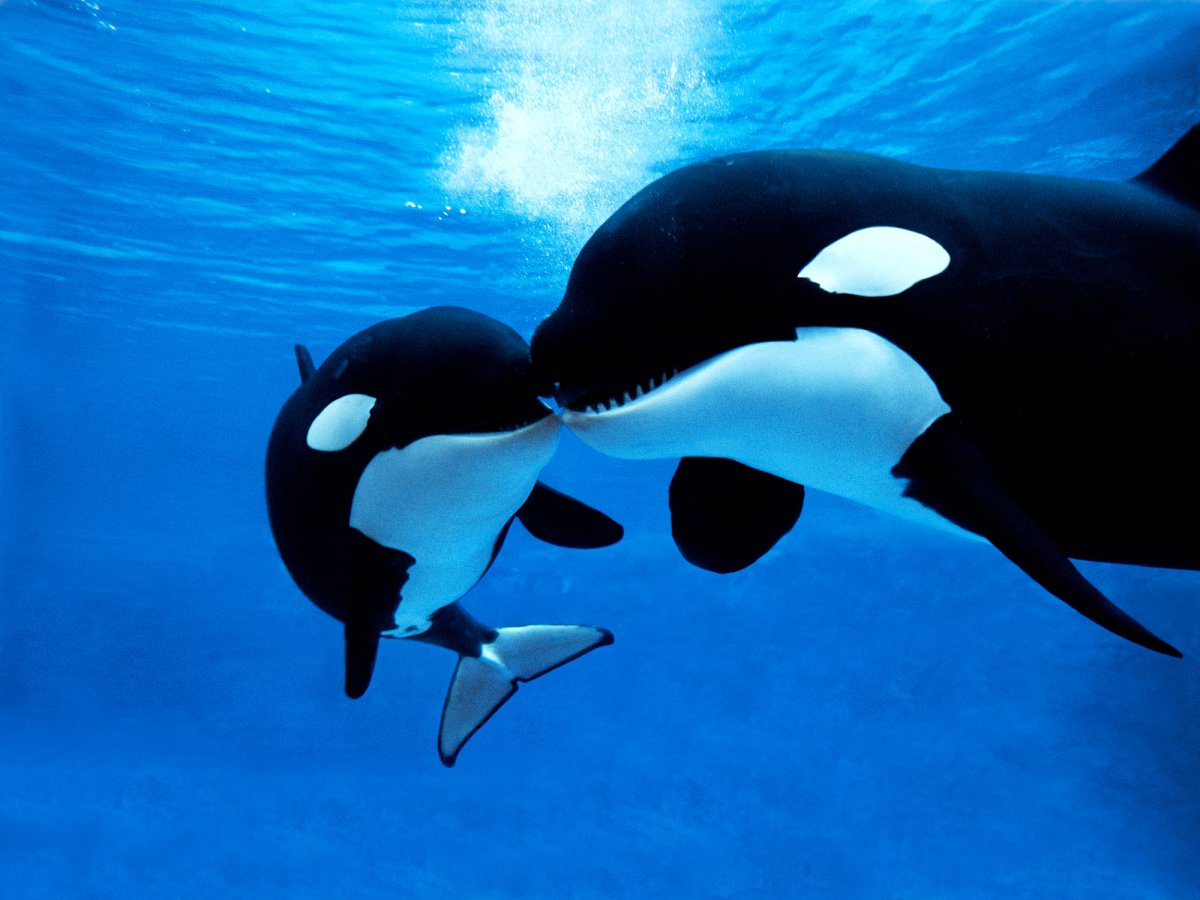
David Lusseau, professor of marine sustainability at the Technical University of Denmark, told Newsweek he doesn't believe the attacks come from aggression.
"I am sorry to say that if a killer whale (even more so with a group of killer whales) had aggressive intentions, most interactions would not end well, at all, regardless of the actions of the skippers," he said.
"So, it is my opinion that this is not aggressive behavior, and definitely not planned behavior with more complex motivations, such as revenge. vessels are objects in the environment of these killer whales. A few individuals figured out that they could manipulate those objects for some unknown motivation (play, social behavior, "dexterity" practice, fun, etc) and it stuck in this population as something to do.
"The question now is whether it is a fad that will pass by or a cultural trait which will become fixed in the population."
Lussaeu believes that this one isolated incident in Scotland is not enough to determine whether they are the same types of interactions being seen in the Strait of Gibraltar.
- Orcas ram yacht during round-the-world Ocean Race
- Dead shark washes up on beach hours after killer whale hunting spree
- Orcas and sharks face to face once again off Cape Cod
Orcas are known for being incredibly intelligent animals, and have previously shown evidence of adopting learned behaviors from senior members of a pod.
In the Strait of Gibraltar, one individual orca has been named by scientists as the main culprit for the attacks.
White Gladis and her pod have been ramming boats in the area for the past few years. In 2020, researchers with the Coordinator for the Study of Marine Mammals (CEMMA) said they were behind 61 percent of the attacks.
"I don't think we have a grasp of the motivation behind this behavior. We can only go by what are the common denominator for all these interactions: it is a subset of individuals from the population which is involved, the outcome of the interaction varies from tragic cases (boat fully disabled) to vessel leaving unscathed, to vessels not being approached in the first place," Lusseau said.
"There are not really commonalities in the details of the vessels with which the killer whales interact (such as size, engine type, hull shape etc), besides the focus on vessel parts. It looks like managing to take a 'trophy' away ends the interaction."
An alternative theory is that White Gladis may have suffered a traumatic moment involving a boat. The attacks could therefore be fueled by a motivation to prevent this from happening again.
Orca, just like other marine mammals, are often in danger of becoming entangled or hit by fishing vessels.
While Rutten's experience mirrors that of the ones seen further south, it seems the man had a lucky escape.
Some interactions in the Strait of Gibraltar have proved nasty—and sailors passing through are now highly aware of the creatures.
A Dutch team that had recently been competing in the Ocean Race— a yachting competition that is held every three or four years— had a terrifying encounter with the orcas while they passed through the region.
"We were aware, and realized that it would be a possibility," Bart Salemans, who was onboard the boat, told Newsweek . "We saw them appear and coming towards us."
Video footage posted to Team's JAJO's Instagram page shows two orcas swimming straight towards the yacht.
One orca heads straight for the rudder, banging its head on it repeatedly.
"It went pretty fast so there was no real time to really feel or get worried. There is some damage on the rudder but nothing structural," Salemans said.
A sailor has even been ambushed twice in these waters.
Dan Kriz, a delivery skipper with the company Reliance Yacht Management, previously told Newsweek that he had his first orca encounter in 2020.
"I was sailing with my delivery crew through the Strait of Gibraltar delivering a yacht when I was surrounded with a pack of eight orcas, pushing the boat around for about an hour," Kriz said.
"We were one of the first boats experiencing this very unusual orca behavior."
At the time, the orcas caused severe damage to the rudder. After the incident, Kriz and his crew were towed to shore in Barbate, Spain.
But three years later, on April 15, 2023, it happened again.
"While delivering a catamaran for the Catamaran Guru company, the same pack of orcas appeared out of nowhere," Kriz said.
"We were about to cross shipping lines and turn south to Canary Islands when we felt like we got hit bad with a wave, but with the second hit, we realized that the same situation from 2020 was happening. My first reaction was, 'Please! Not again." There is not much one can do. They are very powerful and smart."
It remains to be seen whether this trend will continue to other locations. But so far, it appears largely concentrated to the Gibraltar strait.
Scientists are continuing to look into potential reasons why.
"I guess the question is not unlike asking why would some humans engage in 'parkour,'" Lusseau said. "Minus the property destruction of course."
Uncommon Knowledge
Newsweek is committed to challenging conventional wisdom and finding connections in the search for common ground.
About the writer
Robyn White is a Newsweek Nature Reporter based in London, UK. Her focus is reporting on wildlife, science and the environment. Robyn joined Newsweek in 2022 having previously worked at environmental publication LetsRecycle. She has also worked on a range of consumer magazines at Damson Media focusing on pop culture, art and health. She is a journalism graduate of Kingston University. Languages: English.
You can get in touch with Robyn by emailing [email protected]
To read how Newsweek uses AI as a newsroom tool, Click here.

- Newsweek magazine delivered to your door
- Newsweek Voices: Diverse audio opinions
- Enjoy ad-free browsing on Newsweek.com
- Comment on articles
- Newsweek app updates on-the-go

Top stories

Netanyahu Rebukes Chuck Schumer: 'Ridiculous'

Donald Trump Could Sue Fani Willis for Defamation

Kate Middleton Interest Massively Overshadows US Searches for Trump, Biden

Aileen Cannon Just Gave Donald Trump a 'Gift': Legal Analyst

Why are orcas attacking boats and sometimes sinking them?

After four years and hundreds of incidents, researchers remain puzzled why orcas, also known as killer whales, continue to ram boats – sinking a few of them – along the Iberian Peninsula. The most-recent incident was the sinking of a yacht on Oct. 31 in the Strait of Gibraltar.
The origin of these interactions remain a "great mystery," said Alfredo López, a University of Santiago biologist, but he does not believe the behavior is aggressive. Orcas are large dolphins, López said. And like dolphins, the events could stem from the orcas’ curious and playful behavior, such as trying to race the boats.
López, who specializes in orcas, and his team, Grupo de trabajo Orca Atlántica (GOTA) , have tracked these encounters since 2020. The team’s recent study theorizes the orcas could also be exhibiting cautionary behavior because of some previous traumatic incident.
Where have killer whales interacted with boats?
GOTA has tracked more than 350 interactions just on the Iberian Peninsula since 2020. Most have taken place along the Strait of Gibraltar, but the orcas’ mischief or self-defense may be spreading north. An incident was reported in June in the Shetland Islands in Scotland .
GOTA defines interactions as instances when orcas react to the presence of approaching boats, such as:
- Interaction without physical contact.
- Some physical contact without damage.
- Contact that causes serious damage that could prevent the navigation of the boat.
Recent incidents when orcas attacked boats and sank them
The Oct. 31 incident occurred in the Strait of Gibraltar where a pod of orcas sank a mid-size sailing yacht named the Grazie Mamma after a 45-minute interaction, Live Science reported .
On June 19 an orca rammed a 7-ton yacht multiple times off the Shetland Islands in Scotland, according to an account from retired Dutch physicist Dr. Wim Rutten in the Guardian.
"Killer whales are capable of traveling large distances, so it is not out of the ordinary that an animal could travel that far," said Tara Stevens, a marine scientist at CSA Ocean Sciences Inc. "To my knowledge, this data is not available, so we cannot confirm at this time if these are the same animals."
Including the Oct. 31 incident, orcas have sunk four boats this year. The previous sinking occured in May , off the coasts of Portugal and Spain, but whale expert Anne Gordon told USA TODAY in May that the incidents shouldn't heighten concerns about the whales.
"Yes, they're killer whales. And yes, their job is to be predators in the ocean, but in normal circumstances there is absolutely zero threat to humans in a boat," Gordon said .
Most of the interactions have involved sailboats, but fishing boats, semi-rigid boats and motorboats haven’t gone unscathed.
Are these the same killer whales attacking boats or unrelated incidents?
López hypothesizes that the interactions could be a self-induced behavior where you're "inventing something new and repeat it. This behavior coincides with the profile of the juveniles." He said it could also be response to an aversive situation: "One or several individuals had lived a bad experience and tried to stop the boat so as not to repeat it. This behavior coincides with the profile of adults."
"Fifteen different orcas from at least three different communities" have been identified, López said. And they are probably teaching the habit to others, or the others are mimicking the behavior. "Without a doubt orcas learn by imitation," López said. The majority of the culprits are juveniles that touch, push and sometimes turn the vessels. He noted that adult males don't appear to be involved.
"Killer whales are incredibly intelligent animals that do learn behaviors from observation of other individuals," Stevens said. "Typically, very unique behaviors such as this are learned 'within' group, meaning individuals of the group may learn from each other and participate, but that does not necessarily mean that the behavior is shared outside the group with other individuals."
Which pods of killer whales are battering the boats?
Orcas operate in a social structure called a pod. These pods generally are a group of several generations of related orcas. Hierarchies are established within them, and they communicate and learn from one another, the study reads.
GOTA researchers have identified the individuals responsible for the interactions . One large pod is made up of three generations. It starts with grandmother Gladis Lamari, her daughter, grandchildren and a few other relatives.
Another pod comprises siblings Gladis Negra and Gladis Peque. Both have been photographed interacting with boats. Their mother, Gladis Herbille, has generally just watched her children at a distance from the boats, the study said.
A third group in the study are siblings and a cousin.
Orcas often tracking bluefin tuna
The movements of orcas depend on the location of their main food source, bluefin tuna. The migratory movements of tuna are very dynamic and predicting exactly where interactions will take place is very difficult, the report said. According to NOAA , Atlantic bluefin tuna are the largest in the tuna family and can reach a length of 13 feet and up to 2,000 pounds. They are a highly migratory species and can migrate thousands of miles across an entire ocean.
About the Iberian orcas
While they are called killer whales, orcas are actually the largest member of the dolphin family. This aquatic marine mammal family includes whales, dolphins and porpoises.
The Iberian orca is a subpopulation of the Atlantic orca population. These orcas are from the Strait of Gibraltar and the Gulf of Cádiz. Iberian orcas are small: 16 to 21 feet compared with Atlantic orcas that measure almost 30 feet.
Orcas in general are fast, reaching speeds up to 27.6 mph. By comparison, a 39-foot sailboat travels at about 9.2 mph.
What should you do if your boat is attacked by killer whales
The study recommended these tips to reduce the duration and intensity of the interaction.
- Stop the boat.
- Leave the rudder loose.
- Radio for help.
According to the GOTA study, most of the vessels involved in interactions are medium-sized (less than 49 feet) sailboats, with a paddle rudder, sailing at an average of 6.9 mph, under both sail and motor.
The interactions have been mostly concentrated in the spring and summer months and have been concentrated in the midday hours. They've lasted on average for 40 minutes, but several last less than 30 minutes.
Types of rudders Iberian orcas have approached
"It is very common for dolphins to interact with the boats and approach," López said. "Before 2020, the orcas did it with frequency but they weren't classified as attacks. Now, sometimes they touch the boat and the encounter is unfairly classified as an attack. They judge socially before understanding what (orcas) do."
Why are killer whales going ‘Moby-Dick’ on yachts lately? Experts doubt it’s revenge
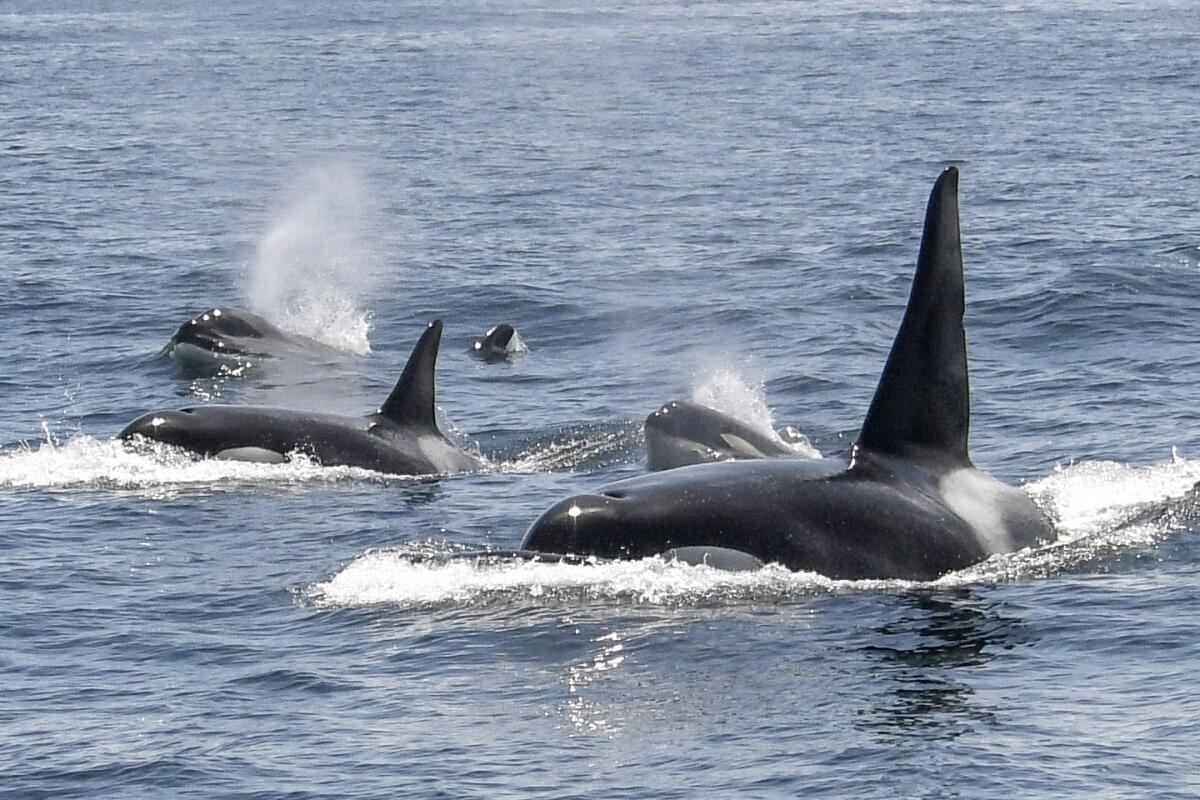
- Show more sharing options
- Copy Link URL Copied!
The attacks started suddenly and inexplicably in the spring of 2020 — pods of endangered killer whales began ramming yachts and fishing boats in European waters, pushing some off course and imperiling others.
Since then, there have been more than 500 reports of orca encounters off the Iberian Peninsula, the most recent occurring Thursday when a trio of whales rubbed against and bumped a racing sloop in the Strait of Gibraltar.
In most cases, the financial and structural damage has ranged from minimal to moderate: Boats have been spun and pushed, and rudders have been smashed and destroyed. Three vessels have been so badly mauled, they’ve sunk.
As the encounters continue, shaky video captured by thrilled and fearful seafarers has ignited a global internet sensation, while experts have struggled to explain the behavior and its timing. The seemingly militant whales have also won over a legion of adoring fans — many transfixed by the notion that the mammals are targeting rich people and exacting revenge for all the wrongs humanity has waged on their species and their ocean home.
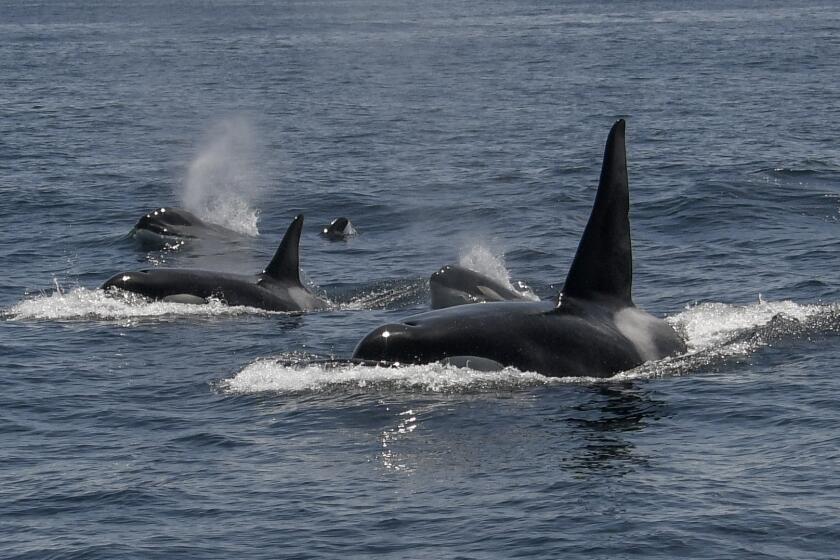
Two dozen killer whales spotted celebrating a hunt off the San Francisco coast
The unusually large group spotted near the Farallon Islands was possibly a meeting of six or seven families.
June 7, 2023
Others wonder if the unusually large pods of multi-ton cetaceans now appearing off the coasts of San Francisco , Monterey and Nantucket, Mass., may soon follow suit.
Despite such rampant speculation on social media, most killer whale scientists have offered a very different interpretation. The Moby-Dick “revenge” narrative for the behavior is highly unlikely, they say.
“That just doesn’t sit right with me,” said Deborah Giles, an orca researcher at the University of Washington in Seattle and director of Wild Orca, a Washington-based conservation research organization.
She noted that despite the long history of orcas being hunted by whalers — and more recently marine parks — these top ocean predators have typically demonstrated a lack of aggression toward humans. There are no verified instances of orcas killing humans in the wild. The only deaths have occurred in marine parks and aquariums, where animals taken from the wild and forced to perform for humans in small tanks have attacked their trainers.
“So, I just don’t really see it as an agonistic activity; I just don’t see it going down like that,” said Giles, who has studied killer whales in the Pacific Ocean, Puget Sound and the Salish Sea for nearly 20 years.
Instead, she thinks the animals are engaging with boats because the vessels are “either making an interesting vibration or sound, or maybe it’s the way the water moves past the keels that is intriguing to these animals.”
The scientific literature is rife with anecdotes and research showing high cognition, playfulness and sociality in the species known as Orcinus orca — and examples of what appear to be the cultural transmission of new behaviors, either via teaching or observation.
In 1987, a female orca in the Pacific waters off North America was spotted sporting a dead salmon on her head. Within weeks, individuals in two other pods also began wearing fish hats. The trend lasted a few months and fizzled out within a year.
In South Africa, the killing of white sharks appears to be growing in popularity among a resident group of killer whales in the waters near Cape Town; Giles has watched a local trend of “phocoenacide” — porpoise killing — grow among a group of whales off the San Juan Islands.

Wildfire burn areas in California are growing ever larger due to greenhouse gas emissions
Between 1996 and 2020, wildfire burn areas in California grew five times larger than in the 25 years prior. Scientists say climate change is to blame.
June 14, 2023
In both cases, the behavior does not appear to be for the purpose of feeding, Giles said. The orcas do not eat the dead animals. For instance, in the case of the porpoises, the killer whales played with them — bandying them about, sometimes surfing with them, other times carrying them on the orcas’ pectoral fins — until the porpoises drowned, at which point they were abandoned, she said.
“Fads” are not unique to orcas. Other animals, including primates and other cetaceans, have also been observed to adopt new behaviors, which then spread through a social group.
Susan Perry, a biological anthropologist at UCLA, has studied a population of capuchin monkeys in Costa Rica, where she has observed and demonstrated the cultural transmission of novel behaviors, including “eye poking” — in which one monkey slips its finger “knuckle deep” between the eyelid and the bottom of another monkey’s eyeball.
But the idea that the whales’ behavior is a response to trauma has gripped many — including the researchers who most closely study this population and first documented the behavior.
In a paper published last year , a team of Portuguese and Spanish researchers suggested the behavior seen in the Strait of Gibraltar orcas could have been triggered by a variety of causes, including trauma.
Alfredo López Fernandez, a killer whale researcher with GT Orca Atlántica, a Portuguese conservation research organization, said it is impossible to know how it started, or which whale or whales may have initially instigated the attacks.
He listed several adult females as the possible original perpetrators — which then taught or showed others how to participate.
There is White Gladis, which seems to be present in most of the attacks; Gladis Negra, which was observed to have injuries in 2020, possibly from a ship strike; and Gray Gladis, which in 2018 witnessed another whale get trapped in fishing gear.
Gladis is a name given to all orcas in the pod that interact with boats; it comes from Orca gladiator, an early nickname given to these boat-jouncing killer whales.
“All of this has to make us reflect on the fact that human activities, even in an indirect way, are the origin of this behavior,” he said.
For Cal Currier’s part, he thinks the whales are entertaining themselves.

Climate & Environment
Bay Area refinery fallout does not pose significant health risk, authorities say
Nearly six months after Martinez Refining Co. released hazardous materials, officials have announced reassuring soil test results.
June 9, 2023
On June 8, as the 17-year-old Palo Alto High School senior sailed through the strait with his father, James, 55, and brother, West, 19, their 30-foot sailboat was accosted and spun in circles.
The rudder was battered, and the trio had to be towed to shore in Spain. “They were playing,” Currier said.
He said that when they pulled in, they were told roughly 30 other boats were ahead of them in line for repairs; half were damaged by the killer whales. He said there were no bite marks on the rudder, and he did not sense aggression from the whales.
For Giles, the Washington killer whale researcher, her biggest concern is that the longer the whales continue this behavior, the more likely it is they’ll get injured or suffer retribution at the hands of humans.
She’s hoping authorities in the region will consider non-traumatic hazing techniques — such as instructing boats to play or make sounds that irritate the whales — to get them to stop. She said studies have shown orcas don’t like the calls of pilot whales and will generally swim away if they hear them. Loud banging sounds, such as hitting a large, metal oikomi pipe underwater, can also be effective.
“Anything that might irritate them, make them lose their interest or swim away,” Giles said.
Currier said he wasn’t too rattled by the whole experience — unlike his dad and brother, who were “scared for their lives.”
The trio have since sold the boat and intend to spend the rest of the vacation on dry land.
More to Read
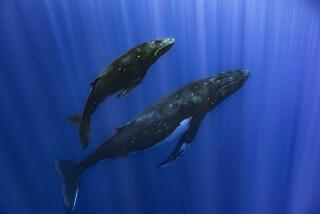
How do whales sing? Lab experiments suggest their voice boxes have a unique feature
Feb. 24, 2024
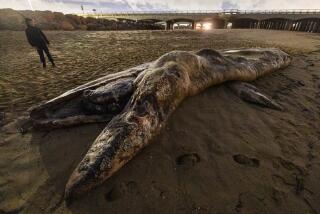
Decaying gray whale washes up on Orange County beach
Feb. 8, 2024
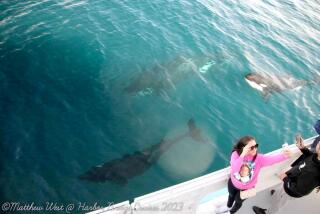
Orcas are flocking to Southern California waters. One bloody, awe-inspiring spectacle shows why
Dec. 27, 2023

Susanne Rust is an award-winning investigative reporter specializing in environmental issues. She is based in the Bay Area.
More From the Los Angeles Times
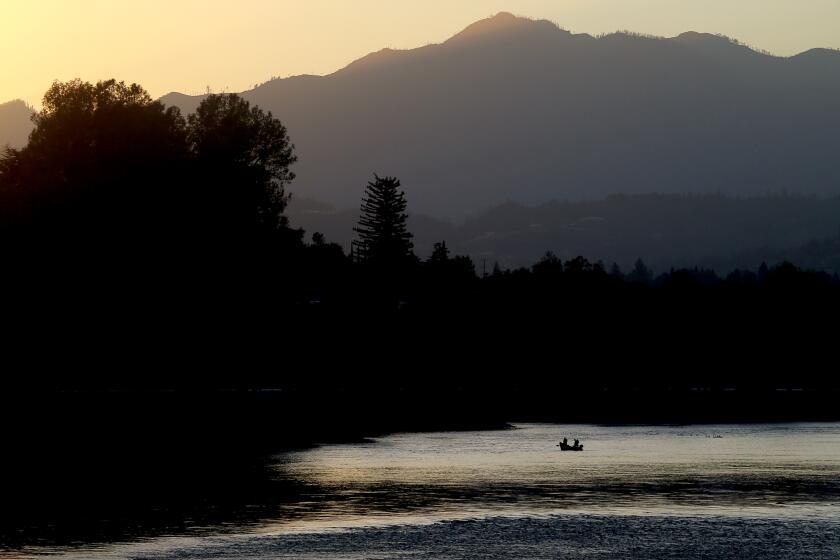
Mystery surrounds sudden increase in steelhead trout deaths near California water pumps
March 15, 2024
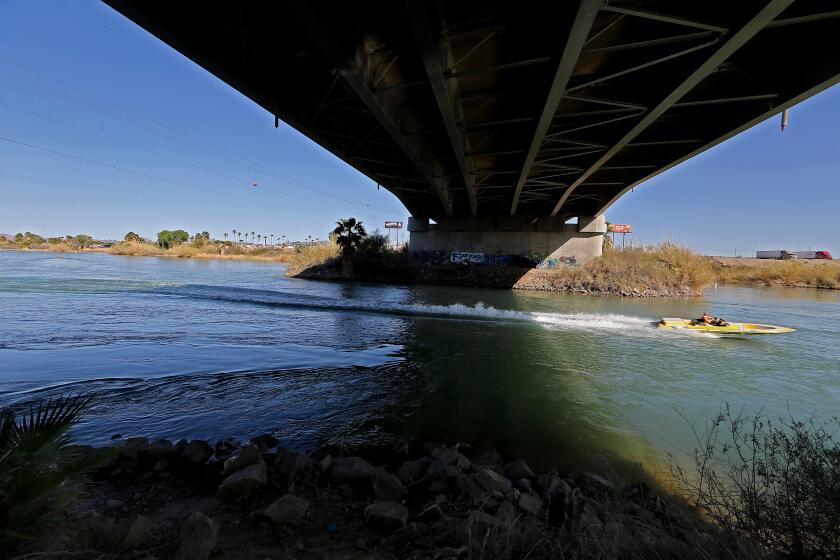
Presence of parasite that’s deadly for dogs now confirmed in California: Signs to watch for
March 14, 2024

World & Nation
How do animals react during a total solar eclipse? Scientists plan to find out in April
March 13, 2024

Opinion: When a dog bites, it’s probably because you weren’t paying attention
March 12, 2024
Orcas Are Ramming Into Ships Off Europe’s Coast
One researcher says this may be a response to a “critical moment of agony” a female orca experienced with a boat
/https://tf-cmsv2-smithsonianmag-media.s3.amazonaws.com/accounts/headshot/SarahKuta.png)
Daily Correspondent
:focal(2500x1667:2501x1668)/https://tf-cmsv2-smithsonianmag-media.s3.amazonaws.com/filer_public/f2/ff/f2ff8532-8785-4ddf-997b-c6cb4d7f6b52/gettyimages-1176332470.jpg)
Orcas are highly intelligent creatures capable of mastering new—and often complex—behaviors, such as generating waves to toss seals off floating pieces of ice and coordinating attacks to take down blue whales , the largest animals on the planet.
Now, at least a handful of the black-and-white marine mammals living in the waters off the coasts of Spain and Portugal are seriously damaging ships. And scientists say the animals appear to be learning the behavior from each other.
On May 4, three orcas rammed into a Swiss yacht called Champagne sailing in the Strait of Gibraltar, reports Yacht magazine. After the first bump, crew members thought the vessel had collided with something, but they quickly realized orcas were pummeling the yacht. The situation eventually became so dire the ship’s crew had to call the coast guard, which sent rescuers. As they towed the boat toward a nearby port, it sank from the damage it had sustained.
Werner Schaufelberger, the vessel’s 72-year-old skipper, tells Yacht magazine that the two smaller orcas shook the rudder while the bigger one rammed the ship from the side. After that, the littler mammals mimicked the ramming action, building up speed before hitting the boat. They mainly impacted the rudder, but also hit the keel.
This is not the first time orcas have intentionally collided with ships off the Iberian coast. Since 2020, the sleek animals have sunk at least three vessels in this area, as Sascha Pare reports for Live Science . The sinkings accompany more than 500 other orca-boat interactions that scientists have documented over the last three years.
Still, these incidents account for only a small fraction of boats on the water. Alfredo López Fernandez , a biologist at the University of Aveiro and a member of the Atlantic Orca Working Group, estimates orcas touch just one percent of ships sailing in a given location, per Live Science . López Fernandez also co-wrote a June 2022 paper on orcas interacting with vessels in the Strait of Gibraltar, which he and other marine biologists described as a disruptive and novel behavior.
Scientists are mostly stumped as to why orcas in this region are suddenly attacking ships, but they have a working theory: A female orca nicknamed “White Gladis,” the individual that started this behavior, may have accidentally collided with a boat, become trapped in illegal fishing gear or experienced some other traumatic incident involving a ship. López Fernandez described this possible past event as a “critical moment of agony” that triggered this new, seemingly aggressive activity.
White Gladis is probably not teaching young orcas to attack ships. However, it’s possible they’re picking up on the behavior by simply watching her, López Fernandez tells Live Science . From there, the action has spread, because young orcas consider it “something important in their lives,” he tells the publication.
It’s also possible that ramming into boats is simply a short-lived fad that orcas will eventually move on from. Orcas have adopted other trends in the past, such as swimming around with dead fish on their heads, as NPR ’s Scott Neuman reported in August. Alternatively, scientists theorized last summer that the animals might just be intrigued by moving parts on a ship—or maybe they enjoy the pressure created by a boat propeller and choose to ram into the rudder when the propeller is shut off.
No matter what the orcas’ motivations are, López Fernandez has urged onlookers to avoid applying human characteristics or emotions to the wild animals. Orcas are not maliciously attacking vessels, but rather, they’re simply responding to the presence of a foreign object in their paths. And “not in an aggressive way,” either, he told Newsweek ’s Robyn White last year.
Despite their “ killer whale ” nickname, orcas are dolphins. Males can weigh up to 11 tons and exceed 32 feet in length. But despite their large size, orcas are extremely skilled swimmers and can attain speeds of more than 30 miles per hour .
Scientists consider the orcas living near the Iberian Peninsula to be a distinct subpopulation. Since 2011, the Spanish environment ministry has listed this group as “ vulnerable ,” and since 2019, the International Union for Conservation of Nature (IUCN) has listed them as “ critically endangered .” In 2011, the subgroup had just 39 members .
The orcas living in the Strait of Gibraltar are no strangers to boats. Since 1999, the orcas have been observed lurking around fishing vessels to capture endangered Atlantic bluefin tuna, their main prey. The animals “find a tuna hooked, and then remove the fish before the fishermen can bring it to the surface,” per the IUCN. (Their other primary hunting tactic involves chasing tuna for up to 30 minutes until the fish are so exhausted they basically give up.)
Perhaps unsurprisingly, the strait’s fishermen “hate the killer whales,” as Jörn Selling, a marine biologist with the Foundation for Information and Research on Marine Mammals, told the Guardian ’s Susan Smillie in 2020. And though the creatures are protected, rumors circulate of fishermen intentionally injuring them, such as by cutting off their fins or poking them with electric prods. Within that context, López Fernandez’s suggestion about a “critical moment of agony” prompting White Gladis to start ramming into ships seems even more plausible, though the theory remains unproven.
Get the latest stories in your inbox every weekday.
/https://tf-cmsv2-smithsonianmag-media.s3.amazonaws.com/accounts/headshot/SarahKuta.png)
Sarah Kuta | READ MORE
Sarah Kuta is a writer and editor based in Longmont, Colorado. She covers history, science, travel, food and beverage, sustainability, economics and other topics.
- Share full article
Advertisement
Supported by
Orcas Sank 3 Boats in Southern Europe in the Last Year, Scientists Say
A small group of orcas is ramming into sailboats in waters off the Iberian Peninsula. Researchers say they do not know what is driving the unusual behavior toward boats.

By Isabella Kwai
Hours into a journey to Portugal from Morocco, the crew of a 46-foot sailing cruiser noticed something was wrong with the rudder. Then, someone shouted what they saw slicing through the choppy waves: “Orcas! Orcas!”
The orcas kept pace with the boat, slamming into its side and chewing at the rudder, according to its skipper, a photographer onboard and video of the encounter. For about an hour, the crew signaled their predicament to the Spanish Coast Guard and tried to stay calm.
“There was nothing we could do,” said Stephen Bidwell, the photographer, who was two days into a weeklong sailing course with his partner when the ramming began. “You’re in awe at the same time as you are nervous.”
The skipper, Gregory Blackburn, said he wrestled for control of the boat as the orcas banged into it, interfering with the rudder. “It’s a reminder of where we are in the food chain and the natural world,” he said.
Eventually the boat managed to motor back to Tangier, Morocco. But marine scientists took note of the episode, on May 2, and said it continued a puzzling pattern of behavior by a small group of orcas off the Iberian Peninsula’s western coast. The orcas, according to the researchers, have caused three boats to sink since last summer and disrupted the trips of dozens of others.
Wild orcas, although apex predators that hunt sharks and whales , are not generally considered dangerous to humans . The animals, the largest of the dolphin family , have been known to touch, bump and follow boats, but ramming them is unusual, marine scientists say. A small group of orcas, numbering about 15, started to batter boats around Spain in 2020, with researchers calling the behavior uncommon and its motivations unclear.
“We know that it is a complex behavior that has nothing to do with aggression,” said Alfredo López Fernandez, a biologist at the University of Aveiro in Portugal who worked on a study published last June on the subject. The orcas show no sign of wanting to hurt humans, he said.
In most sightings, the orcas do not change their behavior or make physical contact, according to the Atlantic Orca Working Group , which began tracking direct interactions — as well as sightings — in 2020.
Since an initial surge that year, orcas have been documented approaching or reacting to vessels about 500 times, causing physical damage about 20 percent of the time, in the high-trafficked seas near Morocco, Portugal and Spain, the group said.
The orcas off the Iberian coast are considered an endangered population : The group arrives in waters near the Strait of Gibraltar every spring from waters deeper and farther north up the coast to hunt tuna. But while they are a usual sight, scientists do not know how to stop the small group’s recent behavior, which has left sailors worried about safety and ship damage, and which has caught the attention of the Spanish and the Portuguese authorities.
“Every week there is an incident,” said Bruno Díaz López, a biologist and the director of the Bottlenose Dolphin Research Institute who was not involved in last year’s research. “We really don’t know the reason.”
In the most recent example, orcas battered a sailboat off the coast of Spain, causing it to sink in the early hours of May 5. The Spanish authorities quickly arrived, and the four people onboard were rescued “in good humor,” said Christoph Winterhalter, the president of the Swiss company that was operating the boat, Hoz Hochseezentrum International.
The University of Aveiro biologist, Dr. López Fernandez, said that it was possible that the three boats sank over the past year because they were vulnerable to leaks or not equipped to endure the damage. (“The condition of the boat was very good,” Mr. Winterhalter said of the one his company had chartered.)
The small group of orcas, including only two adults, were responsible for a majority of the interactions with boats, which number some 200 a year and range from the North African coast to France, according to Dr. López Fernandez.
Researchers do not know what is behind the behavior. Some have speculated that it is an “aversive behavior” that could have started after an incident between an animal and a boat, like an entanglement in fishing line, or an invented behavior from young orcas that is being repeated.
Those remain only theories, though Dr. López Fernandez said it appeared that the behavior might be passing between local animals.
“We know that orcas share their culture with their young and with their peers,” he said, adding that they learned from imitation. But because the behavior has been observed only in this particular subpopulation of orcas, he said that it was unlikely to pass onto distinct orca groups that populate waters around the world.
Given the lack of evidence and the presence of young orcas in the group, other scientists expressed skepticism that the behavior stemmed from a boat incident and believed that the animals may simply be playing.
“They’re getting some sort of reward or thrill from it,” said Erich Hoyt, an orca expert and research fellow with Whale and Dolphin Conservation, a wildlife charity. “Play is part of being a predator.”
Scientists say that aside from having sailors avoid the area, they do not know how to stop orcas from bothering sailboats, which tend to be quieter than most vessels and therefore more attractive to the animals.
It has also left conservationists worried about how humans will treat the orca population, especially as sailors in the region express growing frustration with the animals.
“I hope that they stop doing it as quickly as they started, because it’s actually imposing a risk on themselves,” said Hanne Strager, a marine biologist and the author of “ The Killer Whale Journals ,” adding that it was putting pressure on an already vulnerable species.
Mr. Bidwell, the photographer, said the episode would not stop him and his partner from booking another sailing trip in June, though perhaps with some changes. “Maybe we don’t go that same route,” he said.
Isabella Kwai is a breaking news reporter in the London bureau. She joined The Times in 2017 as part of the Australia bureau. More about Isabella Kwai
- Skip to main content
- Keyboard shortcuts for audio player
Killer whales are 'attacking' sailboats near Europe's coast. Scientists don't know why
Scott Neuman
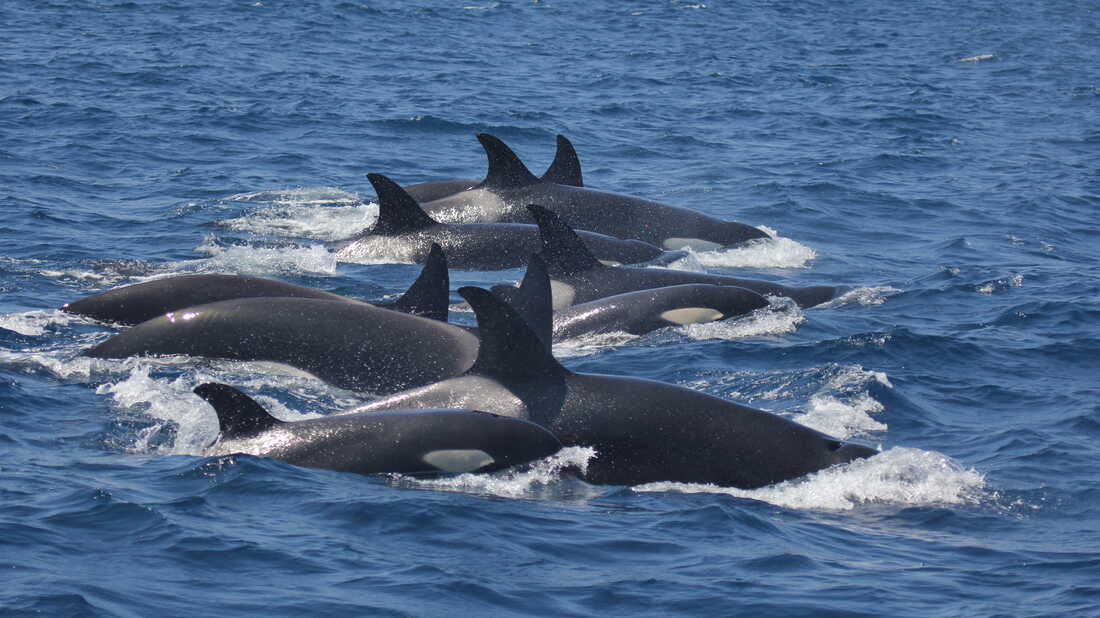
An orca pod seen in the Strait of Gibraltar in 2021. Renaud de Stephanis/CIRCE Conservación Information and Research hide caption
An orca pod seen in the Strait of Gibraltar in 2021.
Ester Kristine Storkson was asleep on her father's small yacht earlier this month, sailing off the coast of France, when she was violently awakened.
Scrambling on deck, she spotted several orcas, or killer whales, surrounding them. The steering wheel swung wildly. At one point, the 37-foot sailboat was pushed through 180 degrees, heading it in the opposite direction.
They were "ramming the boat," Storkson says. "They [hit] us repeatedly ... giving us the impression that it was a coordinated attack."
"I told my dad, 'I'm not thinking clearly, so you need to think for me,'" the 27-year-old Norwegian medical student says. "Thankfully, he is a very calm and centered person, and made me feel safe by gently talking about the situation."
After about 15 minutes, the orcas broke off, leaving father and daughter to assess the damage. They stuck a GoPro camera in the water, she says, and could see that "approximately three-quarters of [the rudder] was broken off, and some metal was bent."

A screen grab from a video of the encounter between a pod of orcas and the Storkson boat. Ester Kristine Storkson/ hide caption
A screen grab from a video of the encounter between a pod of orcas and the Storkson boat.
For any vessel, losing steering at sea is a serious matter and can be dangerous in adverse conditions and some sailboats have had to be towed into port after orcas destroyed their rudders. Fortunately, the Storksons had enough of their rudder left to limp into Brest, on the French coast, for repairs. But the incident temporarily derailed their plan to reach Madeira, off northwest Africa, part of an ambitious plan to sail around the world.
There is no record of an orca killing a human in the wild. Still, two boats were reportedly sunk by orcas off the coast of Portugal last month, in the worst such encounter since authorities have tracked them.
The incident involving the Storksons is an outlier, says Renaud de Stephanis, president and coordinator at CIRCE Conservación Information and Research, a cetacean research group based in Spain. It was farther north -- nowhere near the Strait of Gibraltar, nor the coast of Portugal or Spain, where other such reports have originated.
That is a conundrum. Up to now, scientists have assumed that only a few animals are involved in these encounters and that they are all from the same pod, de Stephanis says.
"I really don't understand what happened there," he acknowledges. "It's too far away. I mean, I don't think that [the orcas] would go up there for a couple of days and then come back."
These encounters — most scientists shun the word "attack" — have been getting the attention of sailors and scientists alike in the past two years, as their frequency seems to be increasing. Sailing magazines and websites have written about the phenomenon, noting that orcas seem to be especially attracted to a boat's rudder. A Facebook group , with more than 13,000 members, has sprung up to trade personal reports of boat-orca encounters and speculation on avoidance tactics. And, of course, there are no shortage of dramatic videos posted to YouTube.
Scientists don't know the reason, but they have some ideas
Scientists hypothesize that orcas like the water pressure produced by a boat's propeller. "What we think is that they're asking to have the propeller in the face," de Stephanis says. So, when they encounter a sailboat that isn't running its engine, "they get kind of frustrated and that's why they break the rudder."
Even so, that doesn't entirely explain an experience Martin Evans had last June when he was helping to deliver a sailboat from Ramsgate, England, to Greece.
About 25 miles off the coast of Spain, "just shy of entering the Strait of Gibraltar," Evans and his crew mates were under sail, but they were also running the boat's engine with the propeller being used to boost their speed.
As Evans was on watch, the steering wheel began moving so violently that he couldn't hold on, he says.
"I was like, 'Jesus, what's this?'" he recalls. "It was like a bus was moving it. ... I look to the side, and all of a sudden I could just see that familiar white and black of the killer whale."
Evans noticed "chunks of the rudder on the surface."
Jared Towers, the director of Bay Cetology, a research organization in British Columbia, says "there's something about moving parts ... that seem to stimulate them."
"Perhaps that's why they're focused on the rudders," he says.
The population of orcas along the Spanish and Portuguese coasts is small and de Stephanis believes that the damage to boats is being done by just a few juvenile males.
If so, they may simply outgrow the behavior, de Stephanis says. As the young males get older, they will need to help the pod hunt for food and will have less time for playing with sailboats.
"This is a game," he speculates. "When they ... have their own adult life, it will probably stop."

An orca calf, photographed in the Strait of Gibraltar, in 2021. Renaud de Stephanis/CIRCE Conservación Information and Research hide caption
An orca calf, photographed in the Strait of Gibraltar, in 2021.
Towers says such "games" tend to go in and out of fashion in orca society. For example, right now in a population he studies in the Pacific, "we have juvenile males who ... often interact with prawn and crab traps," he says. "That's just been a fad for a few years."
Back in the 1990s, for some orcas in the Pacific, something else was in vogue. "They'd kill fish and just swim around with this fish on their head," Towers says. "We just don't see that anymore."
Watch CBS News
Killer whales are ramming into boats and damaging them. The reason remains a mystery.
By Caitlin O'Kane
May 25, 2023 / 2:27 PM EDT / CBS News
Reports of killer whales appearing to try and capsize boats off the coast of Spain and Portugal have raised questions about the giant sea creatures and the motive behind their erratic actions. The behavior is unusual, and began in 2020, says Andrew W. Trites, professor and director of Marine Mammal Research at the University of British Columbia.
In the past two years, these incidents have more than tripled according to data released by GTOA , a group that researches orcas in the region.
"Nobody knows why this is happening," Trites told CBS News. "My idea, or what anyone would give you, is informed speculation. It is a total mystery, unprecedented."
Trites said there is no doubt whales are damaging boats and terrifying the people on board, but the reason is a mystery. He said, however, there must be something positively reinforcing this behavior and the benefits for the whales outweigh the cost.
Only a small group of killer whales, also called orcas, is showing the behavior of ramming into boats, including yachts and sailboats, and it appears the action is spreading through their population. Trites said in 2011, there were only about 39 whales in the small group.
The whales are seen near Spain and Portugal, often in the summer, and dozens of people have reportedly witnessed this behavior.
Last week, a group of killer whales broke the rudder and pierced the hull of a sailboat in the area. The crew of four onboard needed to call authorities for help and we were rescued, Reuters reports . Their boat was towed back to the port for repairs. Earlier this month, three orcas impacted a sailing yacht. The boat was so flooded after the incident that it could not be towed back.
This is just one of about 20 instances recorded in the area this month by GTOA , a group that researches orcas in the region. The Spanish Transport Ministry has advised boaters should leave the area if they observe a change in an orca's direction or speed and should report any interactions, according to Reuters.
GTOA says 52 interactions were recorded between the Strait of Gibraltar and Galicia in northern Spain between July and November 2020. The following year saw 197 interactions and in 2022, there were 207 interactions. The incidents primarily affect sailboats, GTOA says.
A study on the disruptive behavior of killer whales was published in 2022. Alfredo López Fernandez, co-author of the study, told Live Science said most of the interactions have been harmless, but at least three ships have sunk since the behavior started in 2020.
López Fernandez, a biologist at the University of Aveiro in Portugal, who also works at GTOA, told Live Science the origin of this behavior is unknown. And while there are some reports speculating orcas are teaching each other, he says the behavior may just be spreading to young orcas because they are imitating older orcas.
Trites doesn't think the incidents are attacks, and while some speculate the whales may be "retaliating," he doesn't believe that theory. "I read that something triggered one of the adult females and she is exacting revenge and teaching the others to do that too by ramming vessels and trying to intentionally sink them," he said. "To ram a vessel makes as much sense as me running full speed into a brick wall. You're going to get injured."
He said he doesn't believe this idea, or the theory that whales are mad that there are too many boats in the ocean. His theory? "I think it's just playful behavior that's gotten way out of hand," he said.
Trites said whales do not eat humans and there are no reports of them attacking any humans. However, this behavior change in the whales is dangerous and could result in a boater being killed.
He said the behavior reminds him of a whale named Luca, spotted off the coast of Vancouver, who separated from his pod and began to follow boats. "He later learned to grab onto the rudders to break them off to disable the boats, to push boats around," Trites said. "In his case, he was seeking social interactions. And he learned he could prolong the interactions by disabling the boats. And then they would have to stay with him."
Trites said killer whales are social, tactile animals. Some like to rub their bodies together while swimming together or ride the wake of boats and feel the sensation of the water pushing them. "I know of many cases where killer whales will come in and almost put their nose up to a propeller of the boat and feel the wash of the water go over them. It'd be like being in a jacuzzi," he said.
Trites said some of the reports from Spain and Portugal are consistent with this behavior – whales putting their noses up to the back of the boat.
"It's a bit hard to know what to make of the accounts because if a researcher who understands killer whale behavior was on board, they may describe it in a different way," he said, adding that while some boaters may feel attacked, a researcher might characterize it as a whale simply rubbing against a boat.
"The positive in here could be from roughhousing with something else – they certainly rough house among themselves – tactile, touching – we know killer whales rake their teeth over the body of another whale – all of this could be behaviors they are turning toward some boat and finding they are getting pleasure out of doing that."

Caitlin O'Kane is a New York City journalist who works on the CBS News social media team as a senior manager of content and production. She writes about a variety of topics and produces "The Uplift," CBS News' streaming show that focuses on good news.
More from CBS News

Dozens feared drowned crossing Mediterranean from Libya, aid group says

Newly discovered giant turtle fossil named after Stephen King character
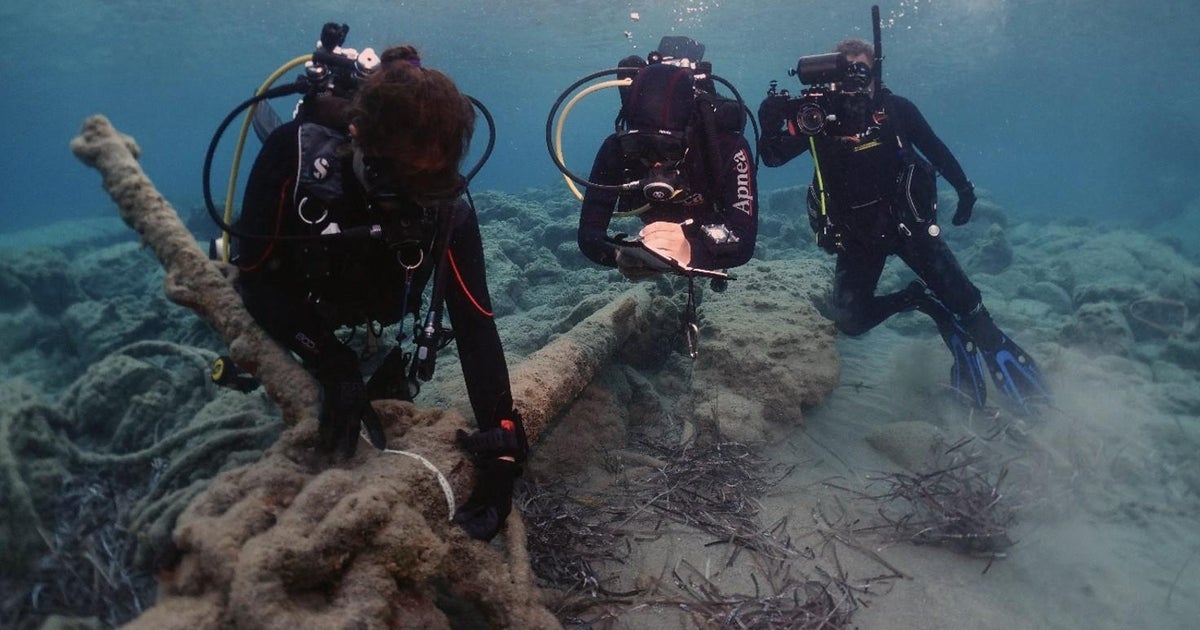
10 shipwrecks spanning 5,000 years of history found off Greece
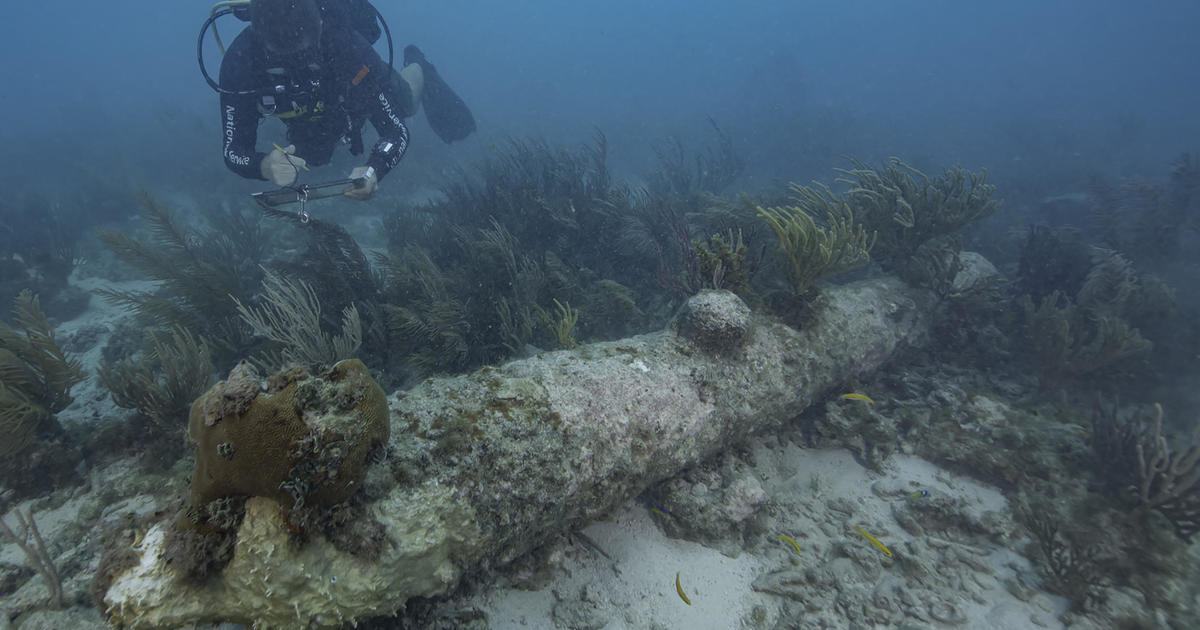
Warship identified off Florida coast 3 centuries after it sank
Orcas are ramming into boats, but experts warn against calling it revenge on humans
Orca behaviour must be separated from human behaviour, researcher says.

Social Sharing

A strange new phenomenon involving sea mammals has captured the public's imagination — and theories that orcas are intentionally targeting humans as an act of revenge have swarmed social media.
This narrative of an "orca-uprising" stems from our tendency to project human psychology onto intelligent wild animals, according to Justin Gregg, a senior researcher for the Dolphin Communication Project and author of If Nietzsche Were a Narwhal: What Animal Intelligence Reveals About Human Stupidity .
"I think we always want to sort of see their behaviour as human-like, which is why people think of it as revenge, because that's a very human-like thing to do," he told The Current guest host, Susan Ormiston.
"We think of other animals as little people, but they live their own complicated lives, which are fundamentally different."

Pods of orcas began toying with yachts in 2020, ramming them, spinning them, and in some cases terrifying those on board. This behaviour is gaining momentum off the southwest coast of Europe and experts believe it's being passed from orca to orca.
Orcas have snapped the rudders of some boats in half and caused at least three sailing vessels to sink, according to the Atlantic Orca Working Group . Their risky behaviour was reported in the North Sea, near Scotland's Shetland Islands, for the first time at the end of June.
In the last three years, there have been more than 400 reports published by Atlantic Orca Working Group of orcas reacting to boats off the coasts of Portugal and Spain, and near the Strait of Gibraltar. Of the cases dating back to 2022, 142 were categorized as "orca interactions," where an animal touched a boat, and 283 were considered "uneventful passages."
But yachts have been around for centuries, so why the sudden pique of interest?
Gregg's theory: "It's probably just a random fluke."
For them, snapping off a killer rudder is not really a big deal. It'd be like us snapping a Pop-Tart in half. - Justin Gregg
Trendy new game or violent attack?
Like any fad, Gregg predicts the orcas will emulate this behaviour for a while, but eventually it will fizzle out. When he first clicked on one of the viral "orca attack" videos, he said he was surprised at how "not violent" the encounter was.
"They're sort of lazily swimming up toward the rudder, and they sort of bump against it and it snaps in half," said Gregg.
"They're enormous animals. So for them, snapping off a killer rudder is not really a big deal. It'd be like us snapping a Pop-Tart in half."
- Video 'Scary moment' as orcas disrupt ocean boat race in latest display of puzzling behaviour
- Orcas ramming boats near Spain no cause for concern in N.L. waters, says expert
Deborah Giles, the science and research director at conservation group Wild Orca, suspects the orcas are simply having a bit of fun, playing with the yachts like enormous bathtub toys.
"They're interacting with the keels that stick down into the water," she said.
Giles prefers the term "interacting" over "ramming" because the latter implies aggression, and she says orcas have never been known to be hostile or aggressive towards humans in the wild.
"[They're] just downright curious," she said, likening these interactions to a cat rubbing up against a person's leg.
"I've literally seen body-surfing killer whales in the wake of these large ships. They're curious animals and they like interacting with their environment."

Mistaking playfulness for violence
Giles is concerned about the possibility of harmful deterrents being used to stop the orcas from damaging expensive vessels.
She points to the Portuguese government's efforts to minimize these interactions in harmless ways.
One of the non-lethal deterrents they're currently testing involves oil pipes. When hung from the sides of boats and banged on, these eight foot steel pipes are meant to make a sound the orcas actively avoid because it reminds them of being deterred from a spill area.
- New baby orca spotted with endangered pod off Vancouver Island
- #teamorca gains First Nations support in North America
Another approach people can use if faced with orca-boat contact, said Giles, is stop the forward motion of the boat by turning off the motor or lowering the sails. This will cause the orcas to lose interest and swim away.
"Hopefully enough time goes by where they're just not getting that positive reinforcement from whatever it is that they're liking with this interaction," said Giles.
Gregg said he fears people might start hating orcas if they don't understand the reality of the situation.
"Hopefully people realize that they are not dangerous and that this behaviour is most likely just play," he said.
ABOUT THE AUTHOR

Magan Carty is an associate producer for CBC Radio in Toronto. They've worked for a variety of network programs including The Current, As It Happens, Spark and IDEAS. Magan possesses a deep love of storytelling and comes from a performance background, with over 10 years of experience across Canada as an actor. You can reach them at [email protected]
Produced by Magan Carty, Niza Lyapa Nondo and Willow Smith


Scientists to test noise deterrents meant to scare orcas after a rapid rise in boat rammings
- Noise deterrents are being developed to scare orcas away from boats, a Portuguese trade association said.
- Orcas off the Iberian coast have been ramming into boats and ripping off their rudders.
- The association said sailors in the area are "afraid" to take their boats into Portuguese waters.
Researchers are planning to develop and test noise deterrents meant to scare away orcas after a rapid rise in reports that the creatures are ramming boats off the Iberian coast.
"Some lines of development of acoustic deterrents are being developed that will be tested this summer, in order to try to find options for the protection of sailboats and minimize the number of interactions," António Bessa de Carvalho, president of the National Association of Cruises (ANC), told Portuguese news agency Lusa.
The ANC, the Portuguese Navy, and the Institute for the Conservation of Nature and Forests have been holding meetings since March to find a solution to orcas damaging boats by ramming into them and grabbing and ripping off their rudders, per Lusa.
Alfredo López of the Grupo de trabajo Orca Atlántica, which is collaborating with the Portuguese government, told Insider the work is in the very early stages.
He added they are focusing on finding solutions that "comply with the legislation" and "do not cause environmental damage."
Noise deterrents typically work by emitting pulses of high-frequency sound to scare away sea creatures from an area.
While types of acoustic deterrents exist, none are specifically designed to be used for orcas and sailboats, he said.
"You have to invent it. They do not exist because there was never a need," he said.
One focus, López said, is to ensure the deterrent does not contribute more noise to the ocean.
"Adding more noise into the ocean can be harmful to living things. That is why the previous comment would not develop continuous emission deterrents," he said.
Dozens of reports of interactions between orcas and boats have been reported, most of which have taken place off the Iberian coast. The creatures' motivations are not clear , but the behavior seems to be spreading among local pods of orcas.
One recent interaction was reported as far north as the Shetland islands, off the coast of Scotland.
A video released on Thursday showed orcas interrupting a boat race in the Atlantic Ocean last week. The video shows the animals repeatedly rubbing against the ship's rudders, Insider previously reported.
"Three orcas came straight at us and started hitting the rudders. Impressive to see the orcas, beautiful animals, but also a dangerous moment for us as a team," skipper Jelmer van Beek said, Insider previously reported.
At least two boats have been sunk as a result of the interactions, and the exchange can leave the boats unable to steer their course and having to be rescued at sea, per Lusa.
"Sailboat owners are very concerned and are currently afraid to take their boats to the Algarve", the southernmost region of Portugal, "as they do every year," Bessa de Carvalho told Lusa.
Desperate sailors have been trying all sorts of techniques to keep orcas away from the boats, such as throwing sand over the side of the ship, navigating backward, hitting the orcas or throwing firecrackers and flares at them, throwing lemons in the water, or hitting dishes and kitchen items to make noise, none of which have been particularly effective, López said.
The Grupo de trabajo Orca Atlántica recommends slowing down the boat's engine if possible. That has worked in about 60% of cases, said López.
For the time being, Lopez said the best way to protect boats is for sailors to "be informed."
"Sailors can consult the website and GT Orcas mobile application (Google Play and Apple Store) to find out about hot spots, be prepared if they sail in those areas, avoid sailing at night and approach the coast, as far as possible," he said.

A single orca killed a great white shark in a shocking 2 minutes. This hunting behavior could mean problems for the fishing industry and tourism.
- A killer whale was observed hunting and eating the liver of a great white shark alone.
- Scientists said the event revealed new insights about the hunting proficiency of orcas.
- The ecosystem impacts of shark-hunting killer whales could affect commercial fishing and tourism.

Researchers observed a single killer whale slaying a great white shark and eating its liver , providing new insights about the hunting practice that could foreshadow potential problems for the fishing industry.
A paper published Friday in the African Journal of Marine Science detailed the event, which occurred in June 2023 off the coast of South Africa.
The research team watched as a male killer whale known as Starboard approached the juvenile white shark and "gripped the left pectoral fin of the shark and thrust forward with the shark several times before eventually eviscerating it," the study said, adding: "Remarkably, the period from seizing the shark by the pectoral fin to eviscerating it lasted less than 2 minutes."
Shortly after the attack, researchers on another boat captured photos of Starboard with "a bloody piece of peach-colored liver in its mouth," according to the paper.
Starboard has been observed killing white sharks in the past however, he usually hunts with a male companion named Port. The study said Port was present during the attack, but he kept his distance, and Starboard acted alone.
The orcas have been hunting white sharks and eating their livers off the coast of South Africa for years. Rare drone footage captured for Discovery Channel's Shark Week in 2022 showed killer whales preying on a white shark .
But the lone orca attack was a rarer phenomenon.
Related stories
"This sighting revealed evidence of solitary hunting by at least one killer whale, challenging conventional cooperative hunting behaviors known in the region," Alison Towner, lead author on the study and a doctoral researcher at Rhodes University, told CNN .
In a video post of the incident shared by the Earth Legacy Foundation , Towner said the predation "represents unprecedented behavior underscoring the exceptional proficiency of the killer whale."
Researchers say much is still unknown about the larger ecosystem implications of shark-hunting killer whales.
In 2022, another study published by the African Journal of Marine Science , for which Towner was also the lead author, suggested white sharks were fleeing a common aggregation site off South Africa because of the killer whales.
But scientists still don't know exactly where those white sharks are going.
"As they relocate, they might end up overlapping with heavy commercial fisheries," Towner told CNN.
A study published in October in the journal Ecological Indicators suggested that some of the white sharks migrated east of the area where they were being hunted by orcas.
The loss of white sharks in South Africa's waters could also impact tourism, as visitors from all over the world travel to the area to observe the predators.
"Over two decades of annual visits to South Africa, I've observed the profound impact these killer whales have on the local white shark population," Primo Micarelli, a marine biologist and an author on the paper, told CNN.
"Despite my awe for these predators, I'm increasingly concerned about the coastal marine ecology balance," he added.
Watch: Shark expert rates ten shark attack scenes in movies and tv
- Main content
Killer whale v shark: Solo orca eats great white
- Published 2 March
This video can not be played
To play this video you need to enable JavaScript in your browser.
Watch: The male orca (in the foreground) was captured on camera hunting a juvenile shark
A solitary killer whale, or orca, has been filmed hunting and killing a great white shark in an "astonishing" attack.
Scientists said it was "unprecedented" and showed the exceptional predatory skills of killer whales.
Two orcas in particular off South Africa's coast have been observed before working together to hunt and kill sharks, including great whites.
"But this caught us off guard," said shark biologist Dr Alison Towner.
Orcas 'learning from adults' to target boats
Whale song mystery solved by scientists
Dr Towner, who is from Rhodes University in Grahamstown, South Africa, has studied the animals for several years. She and her colleagues published a detailed and grisly account of their new observations in the African Journal of Marine Science.
The attack - filmed in 2023, which you can watch here - was, scientists, said "solo and swift". The male killer whale killed the shark and consumed its liver - all in under two minutes.
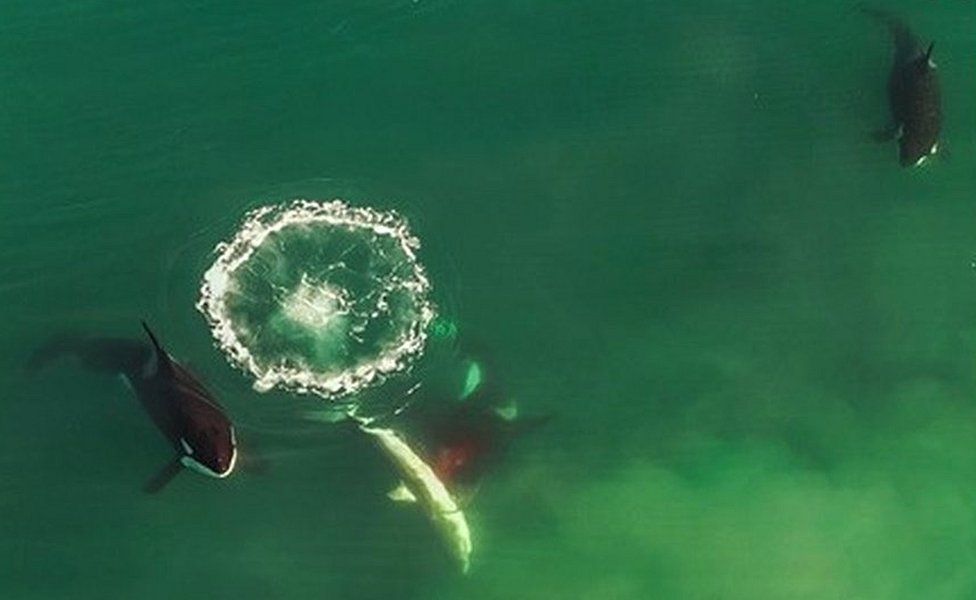
Scientists first captured drone footage of two male orcas working together to hunt great white sharks in 2022 .
The scientists then reported that the animals, nicknamed Port and Starboard because their dorsal fins are bent in opposite directions, "exhibited a predilection for extracting and consuming the sharks' livers".
During the attacks, the sharks would tightly circle the killer whales, in a desperate attempt to avoid predation," recalled Dr Towner.
In this newly reported attack, Starboard hunted on his own. Scientists described how the orca gripped the left pectoral fin of a 2.5m long juvenile shark and "thrust forward several times before eventually eviscerating it".
Marine mammal scientist Dr Luke Rendell from the University of St Andrews said it was "a really beautiful observation" of the behaviour.
"It's interesting that it's just one animal," he told BBC News, and how much skill it demonstrates in tackling the shark - ramming it in the side and grabbing the pectoral fin to keep away from those big, nasty jaws.
"A great white shark is a nice, big concentration of food, so it's perhaps unsurprising that some populations [of orcas], where these sharks occur in sufficient numbers, have learned to exploit that."
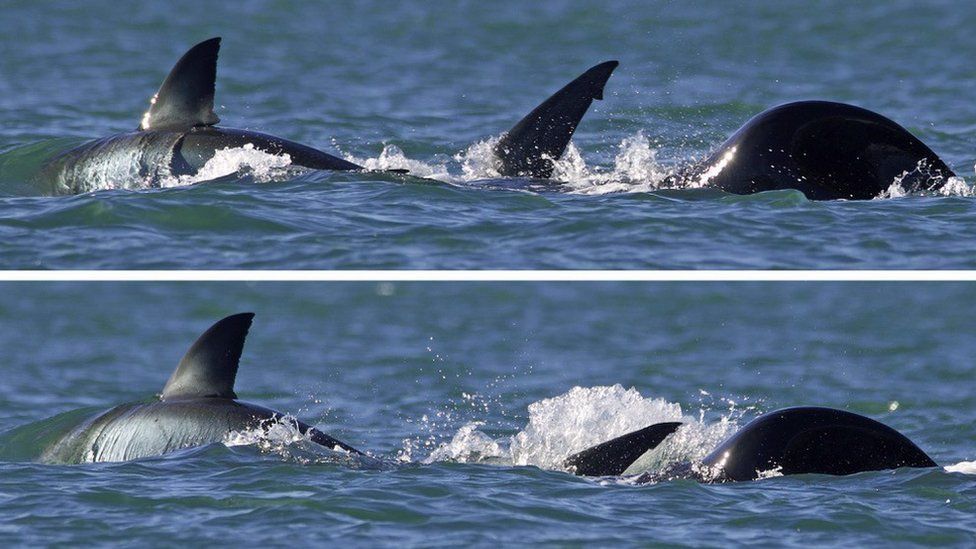
It raises questions about how killer whale behaviour might be affecting the shark populations in the areas.
The scientists do not know what is driving the behaviour, but Dr Towner told BBC News that it was becoming evident that "human activities, like climate change and industrial fishing, are exerting significant pressures on our oceans".
And there could be health repercussions for killer whales hunting sharks, including ingesting toxins and metals from shark flesh.
"Disruptions in the balance of apex predators can affect other species too," explained Dr Towner. "Endangered African penguins could face increased predation by cape fur seals [if the fur seals are not being eaten by] white sharks."
Dr Rendell pointed out that there was no way of knowing if the behaviour was new or simply observed for the first time. "But what really stands out is how skilful these animals are as hunters."
Dr Towner added that every discovery in these interactions [between orcas and sharks] was "fascinating".
Related Topics
- Marine biology
- Killer whales
- South Africa
- Published 2 August 2023
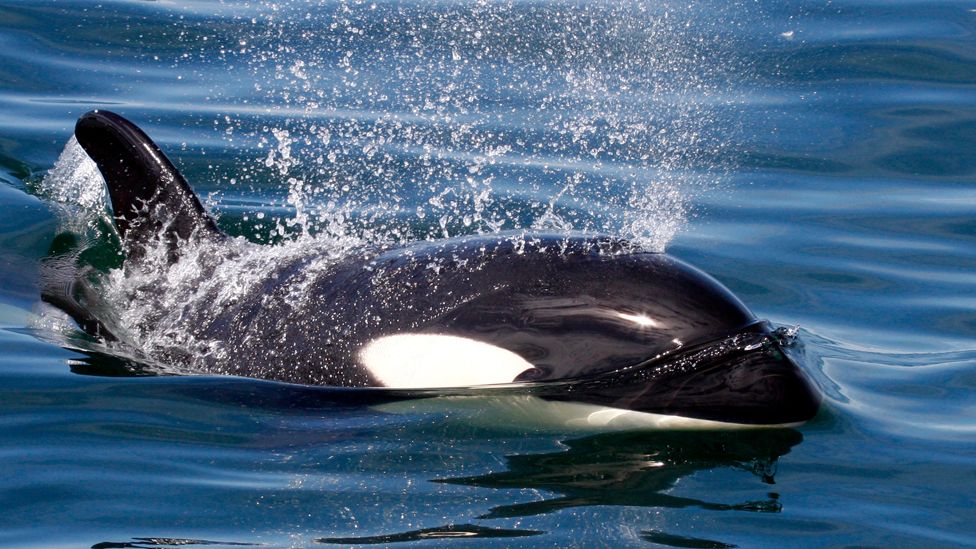
- Published 22 February
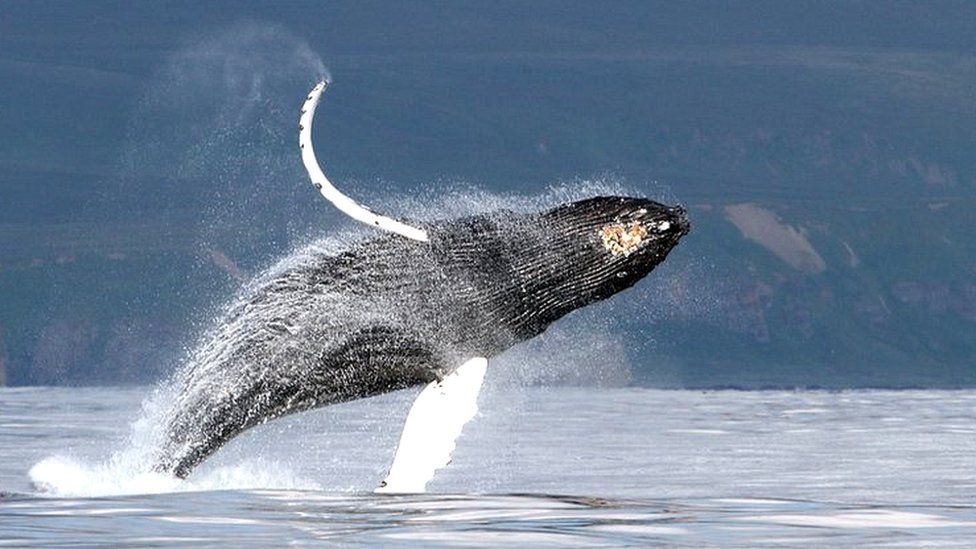
Orca mothers keep 5-tonne sons out of trouble
- Published 20 July 2023
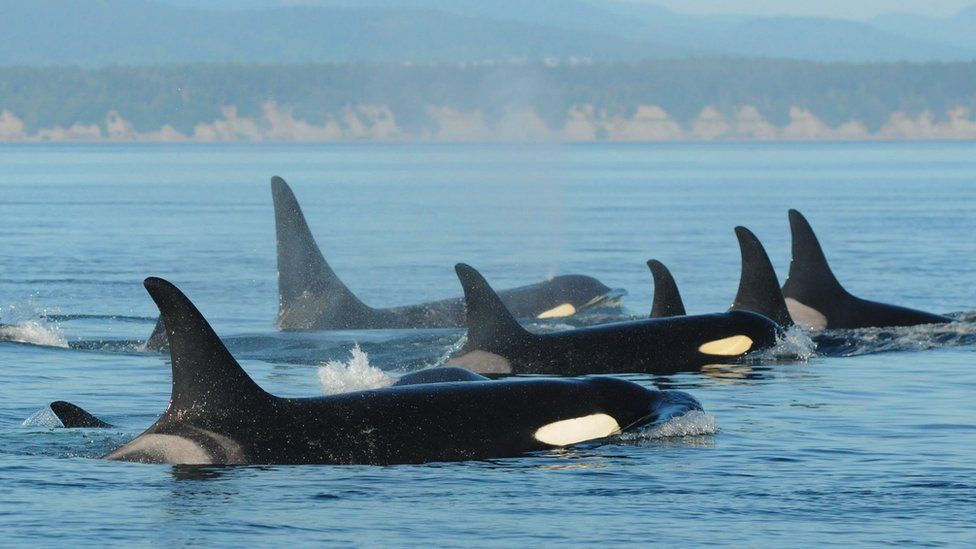
Great white shark gets liver torn out by lone orca in under 2 minutes in shocking shift of hunting methods
Disturbing footage shows the moment a single orca chased down a great white shark and killed it, then swam away with the shark's liver in its jaws.
New footage captures a lone orca killing and eating a great white shark in just 2 minutes, revealing they do not need to hunt in packs to take down one of the ocean's most formidable predators.
In the video, the shark desperately attempts to flee as the orca follows close behind, before disappearing beneath the surface. Shortly after, the orca is seen swimming away carrying a liver in its jaws.
In a study published March 1 in the African Journal of Marine Science , scientists confirmed this case was the first ever record of a lone orca (Orcinus orca) hunting and consuming a great white shark (Carcharodon carcharias) without the help of its podmates.
The incident took place in June 2023 when researchers on a tourist boat saw two orcas — known as Port and Starboard because of their collapsed dorsal fins — south of Seal Island, South Africa. The two orcas already have a reputation for attacking great whites and feasting on their nutrient-rich livers — a new behavior that has led great whites to abandon a popular hunting ground .
After approaching the orcas, the researchers noticed an oily substance floating on the surface, birds diving into the water and "the distinct smell of shark liver," according to the study. The researchers speculated that the pair of orcas may have already killed a shark before the boat arrived.
"Once you've smelled it, you'd recognize it again," lead author Alison Towner , a marine biologist at Rhodes University, told Live Science in an email. She explained that shark liver smells rich, fatty and not altogether unpleasant, but very hard to describe.
Nearly an hour later, the boat saw an 8-foot-long (2.5 meters) juvenile white shark at the surface with Starboard chasing behind. "The killer whale pushed the shark forward by its pectoral fin while it thrashed on the surface," Towner said.
By grabbing the shark's pectoral fin and shaking it, Starboard tore the shark open in precisely the right spot to remove its liver.
Related: Great white shark ripped in 2 was 'loaded' with orca DNA, scientists say
A few minutes later, a shark cage diving boat that happened to be nearby saw Starboard swim past "with a bloody piece of peach-coloured liver in its mouth," according to the study. Port stayed around 330 feet (100 m) away throughout and was not involved in the predation.
"The moment Starboard rapidly preyed on my favorite shark species was both devastating and intensely powerful," Esther Jacobs, the founder of shark conservation initiative Keep Fin Alive, who saw the attack, said in a statement .
Although the onlookers didn't see the moment Starboard removed the shark's liver, as this happened underwater, Towner believes the shark would've been killed instantly.
The exact mechanism of how orcas shaking a shark can tear it open is still unclear, but more clues arrived the next day when the carcass of a different great white shark — this one measuring 11.5 feet (3.5 m) — washed up nearby. "The interesting stretch marks on its flank may suggest torsion induced by thrashing," Towner said.
— 11 ways orcas show their terrifying intelligence
— Scientists investigate mysterious case of orca that swallowed 7 sea otters whole
— Orcas are learning terrifying new behaviors. Are they getting smarter?
Orcas target sharks' fatty livers because of their high nutritional value. "Shark livers are packed with rich, oily lipids , making up to one third of their body mass in some species," Towner said.
Sometimes known as the wolves of the sea , orcas have strong social bonds and usually hunt in groups. While they have been known to hunt other species alone — including seals , porpoises , and penguins — this is the first record of a single orca killing a great white. In previous accounts, attacks have involved between two and six orcas.
This finding may have important conservation implications. "Altering the top predator balance has cascading impacts," Towner said. "With most sharks already facing various man-made pressures, orca predation adds further strain and could be a tipping point in some regions for some species."
Sign up for the Live Science daily newsletter now
Get the world’s most fascinating discoveries delivered straight to your inbox.

Melissa Hobson is a freelance writer who specializes in marine science, conservation and sustainability, and particularly loves writing about the bizarre behaviors of marine creatures. Melissa has worked for several marine conservation organizations where she soaked up their knowledge and passion for protecting the ocean. A certified Rescue Diver, she gets her scuba fix wherever possible but is too much of a wimp to dive in the UK these days so tends to stick to tropical waters. Her writing has also appeared in National Geographic, the Guardian, the Sunday Times, New Scientist, VICE and more.
Elusive megamouth shark caught off Zanzibar for 1st time, gets sold for $17
16-foot-long shark bites stranded pygmy whale's head off as human tries to rescue it
Why aren't all orbits circular?
Most Popular
By Keumars Afifi-Sabet March 15, 2024
By Keith Cooper March 15, 2024
By Robert A. Schwartz March 15, 2024
By Samantha Mathewson March 15, 2024
By Emily Cooke March 14, 2024
By Stephanie Pappas March 14, 2024
By Jennifer Zieba March 14, 2024
By Tom Metcalfe March 14, 2024
By Eos.org, Erin Martin-Jones March 14, 2024
By Ben Turner March 14, 2024
- 2 Mass grave of plague victims may be largest ever found in Europe, archaeologists say
- 3 India's evolutionary past tied to huge migration 50,000 years ago and to now-extinct human relatives
- 4 1,900-year-old coins from Jewish revolt against the Romans discovered in the Judaen desert
- 5 Dying SpaceX rocket creates glowing, galaxy-like spiral in the middle of the Northern Lights
- 2 1,100-year-old Viking sword pulled from UK river by magnet fisher
- 3 James Webb telescope confirms there is something seriously wrong with our understanding of the universe
- 4 'Flow state' uncovered: We finally know what happens in the brain when you're 'in the zone'
March 1, 2024
A Lone Orca Killed a Great White Shark in First Documented Attack of Its Kind
For the first time, scientists observe a single killer whale killing a great white shark, and then eating its liver
By Stephanie Pappas
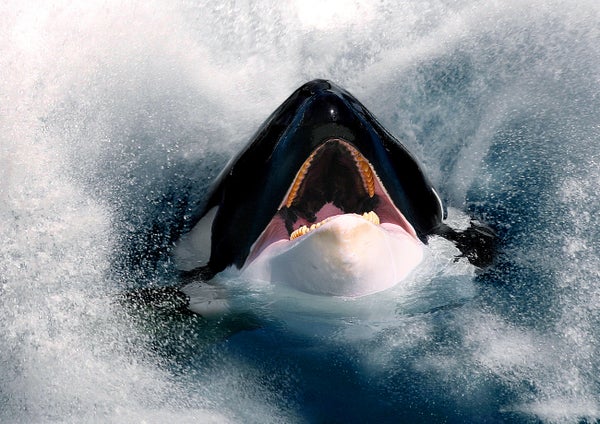
A killer whale breaches the sea surface.
blickwinkel/Alamy Stock Photo
An infamous orca killed a great white shark by itself last year in South Africa and devoured the shark’s nutritious liver. It’s the first time a killer whale has been observed preying on a great white shark alone, and the entire attack took less than two minutes.
“While killer whales can hunt large prey individually, this is the first documented instance in South Africa involving white sharks as prey,” says Alison Towner, a senior white shark biologist at the conservation and ecotourism organization Marine Dynamics.* “The surprising element was how quickly the killer whale immobilized and consumed the liver of the shark.”
The killer whale involved is well known in Mossel Bay, South Africa. Dubbed “Starboard” for his bent-to-the-right dorsal fin, this orca has been observed preying on white sharks in the area with its travel partner, “Port,” for years. (Port, another male, has a dorsal fin that bends to the left.)
On supporting science journalism
If you're enjoying this article, consider supporting our award-winning journalism by subscribing . By purchasing a subscription you are helping to ensure the future of impactful stories about the discoveries and ideas shaping our world today.
The researchers aren’t sure why Starboard went after the shark on his own or how frequently this behavior occurs, they report today in the African Journal of Marine Science . Before now Port and Starboard had always been observed working together in attacking white sharks, sometimes leading groups of up to six total orcas in drawn-out pack hunts. Towner and her colleagues previously reported that these hunts usually end in a feast of shark liver for the predatory whales .
But on the afternoon of June 18, 2023, when onshore observers spotted the two orcas, that wasn’t the case. The researchers studying the pair launched a small vessel and followed them. In the killer whales’ wake, they discovered a slick of gore on the ocean surface, accompanied by the smell of shark liver. “Shark liver has a unique and recognizable scent—oily,” Towner says. “Once you’ve encountered it, you won’t mistake it for anything else.”
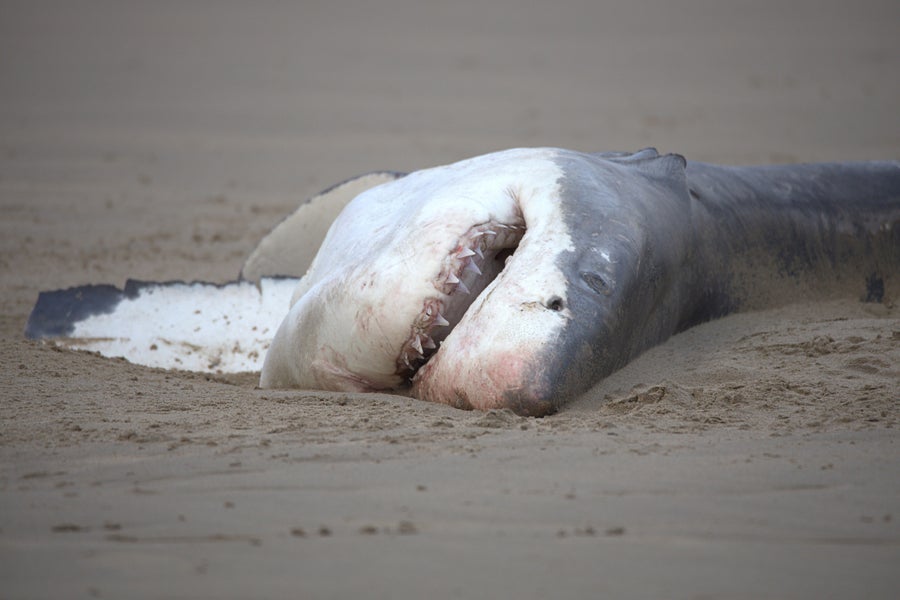
A great white shark carcass.
Credit: Christiaan Stopforth, Drone Fanatics SA ( CC BY )
The slick suggested that the orcas had attacked and killed something. The boat followed the animals, which were swimming apart from each other. Suddenly a great white shark appeared at the surface, with Starboard in hot pursuit. As researchers watched, the orca grabbed the shark’s left fin and thrust forward with its mouth, eviscerating the shark. Several minutes later, observers aboard a nearby shark-diving boat watched as Starboard swam a victory lap by their vessel, holding a bloody piece of shark liver in his mouth.
The shark killed in the attack was also known to biologists. “After 24 years of working with the great white, to see an orca—that, before [this], I loved a lot—killing my preferred shark, I was really stressed, is the minimum that I can say,” says Primo Micarelli, a marine biologist at the University of Siena in Italy who was on the shark-diving vessel. At the same time, he said, he knew the solo attack was unusual and important.
The vanquished shark was a juvenile about 2.5 meters (8.2 feet) long. The next day a slightly larger great white shark measuring 3.55 meters (11.6 feet) long washed ashore nearby, also liverless. This shark may have been the one killed in the first, unobserved attack that left the gory slick, the researchers wrote in their paper.
Port and Starboard are a “gift that keeps on giving,” says Isabella Reeves, a doctoral candidate in marine biology at Flinders University in Australia, who has collaborated with Towner but was not involved in the current research. The whales are rewriting some of what biologists thought they knew about orcas, she says. “I think perhaps what surprises me most is that there seems to be some degree of ‘leadership’ from these two male killer whales during these hunts, which is unusual and not recorded much in the wild,” she says. “Females generally take the lead while hunting.”
Orcas in South Africa are not unique in their shark-hunting tendencies, says Jennifer Tennessen, a senior research scientist at the Center for Ecosystem Sentinels at the University of Washington. In the Pacific Northwest, offshore bands of orcas include a variety of sharks in their diets, she says. But these animals are found far off the coast of Oregon, Washington and British Columbia, so their behaviors are hard to observe, she says.
“There’s much to learn still about how many individuals are involved in these shark predations in South Africa and the frequency of these occurrences,” Towner says. “In fact, there is a whole lot we need to learn about killer whales in this part of the world in general. Most of them are difficult to access as they move at high speed and spend a lot of time away from the coasts. Citizen scientists and drones are contributing such valuable information.”
* Editor’s Note (3/4/24): This sentence was edited after posting to correct the description of Alison Towner’s current position.
- Search Please fill out this field.
- Manage Your Subscription
- Give a Gift Subscription
- Sweepstakes
Orca Whale Spotted Killing Great White Shark in Under 2 Minutes in 'Unprecedented' Attack
Scientists say the implications of a killer whale hunting solo, rather than in a group, could be huge for the local ecosystem
Charlotte Phillipp is a Weekend Writer-Reporter at PEOPLE. She has been working at PEOPLE since 2024, and was previously an entertainment reporter at The Messenger.
:max_bytes(150000):strip_icc():format(webp)/P1110132copy-7df1eb396ec342e1a15d71e29dada6f1.jpg)
- Since at least 2017, scientists have observed two killer whales living near South Africa team up to attack and kill great white sharks
- In a recent article, scientists shared that they recently observed one of the orca whales in the shark-hunting pair kill a great white shark by itself in less than 2 minutes
- Experts believe this new hunting tactic could be a response to climate change and may have an impact on other ocean species
Scientists have observed an orca whale killing a great white shark alone off the coast of South Africa, and the attack could offer insights into how the whale species' hunting tactics have changed.
Since at least 2017 , a pair of orcas in the waters around South Africa have been killing great white sharks for their livers — a nutrient-dense meal for the whales — and leaving the rest of the sharks' bodies behind. The hunting tactic has been driving sharks away from the coastal waters around Cape Town, according to scientists studying the shark-hunting duo.
But this solo orca attack, observed by scientists in June 2023 and featured in an African Journal of Marine Science article published in March, showed one of the orcas killing an 8.2-foot-long shark by itself in under two minutes. According to one of the biologists who observed it, the ferocity of the attack was "unprecedented" and "astonishing."
Speaking with BBC , Rhodes University shark biologist Dr. Alison Towner told the outlet that the male orca, nicknamed Starboard, grabbed the young great white by its fin and "thrust forward several times before eventually eviscerating it" to get at its liver.
A newly released video of the attack shows Starboard quickly killing the shark before swimming away with the nutrient-rich liver in his mouth, passing by a nearby boat full of tourists.
According to the recent article about the shocking killer whale attack, this is the first widely observed occurrence of an orca hunting and killing a great white shark by itself.
This occurrence also challenges existing theories about the hunting strategies of killer whales, as previous research led scientists to believe that orcas primarily hunt in groups rather than by themselves. Previous killer whale attacks on the sharks involved multiple orcas — including Starboard’s partner, another male named Port — and took up to two hours, the researchers wrote.
Dr. Luke Rendell, another scientist from the University of St. Andrews in Scotland, told BBC that it was "unsurprising" that whales had learned to target great white sharks, as orcas may be facing challenges finding food due to issues like climate change and other human-led changes in their ecosystem.
"A great white shark is a nice, big concentration of food, so it's perhaps unsurprising that some populations [of orcas], where these sharks occur in sufficient numbers, have learned to exploit that," he said.
"Human activities, like climate change and industrial fishing, are exerting significant pressures on our oceans," Towner added.
The scientists behind the recent article on the solo killer whale attack first reported their findings about Port and Starboard in 2022. They wrote in the African Journal of Marine Science that they had traced at least 8 great white shark killings back to the pair. According to the researchers, several sharks had their hearts and livers removed.
Dr. Primo Micarelli, a biologist at Italy's Sharks Studies Centre and the University of Siena, told CNN in a statement that while seeing such a powerful attack was "unforgettable," he also worries about the ecological implications it has for both orcas and great white sharks.
"Despite my awe for these predators, I'm increasingly concerned about the coastal marine ecology balance," Micarelli told the outlet.
Never miss a story — sign up for PEOPLE's free daily newsletter to stay up-to-date on the best of what PEOPLE has to offer, from celebrity news to compelling human interest stories.
Orcas are the great white shark's only predator, aside from humans. Killer whales grow up to 30 feet in length and can weigh more than six tons, while great white sharks can reach up to 22 feet long and weigh around 2.5 tons.
Towner told BBC that the orcas' new hunting habits could impact other species, such as African penguins, which could face more danger from cape fur seals — as great white sharks usually hunt the seals.
"These are groundbreaking insights into the predatory behavior of this species," Towner told CNN. "The presence of these shark-hunting killer whales possibly ties into broader ecosystem dynamics. Rapid developments in this phenomenon make it challenging for science to keep pace."
- Australia edition
- International edition
- Europe edition

Orcas are ramming yachts off the Spanish coast – is the whale world rising up?

One explanation is that their behaviour is a reaction to past trauma inflicted on one member of the pod by humans
R ecent accounts of “attacks” on vessels by orcas off the Iberian peninsula are challenging the way we expect the natural world to behave. Increasing in number since 2020, from northern Portugal to the strait of Gibraltar, these incidents suggest the need for a cetacean scene investigation team. On 4 May, in one of the most extreme events, orcas sank a yacht.
“There were two smaller orcas and one larger,” the skipper Werner Schaufelberger told German magazine Yacht . “The little ones shook the rudder at the back while the big one repeatedly backed up and rammed the boat with full force from the side.”
The word “attack” used in conjunction with animals is a human judgment; their actions are more likely to be defensive. But there is definitely something strange going on. Andrew Sutton, an experienced underwater photographer with whom I work and who is familiar with these particular orca pods, has noted them “doing weird things” in the strait, including “whacking rudders off and annoying fishermen”.
Having witnessed two big intervention episodes last year, he suspects that an increase in vessels may be a factor – not least because the strait is now the most popular route for migrants setting off from Morocco.
The Grupo Trabajo Orca Atlántica (GTOA, or Atlantic Orca Working Group ), a highly respected partnership of Spanish and Portuguese scientists, has recorded hundreds of such reports, with 29 incidents this year around the strait alone. They believe that just 15 individuals, of a population of more than 50, are responsible.

Dr Alfredo López Fernandez, of GTOA, told me that they have two hypotheses. One, the orcas “have invented something new and repeat it. This behaviour matches the profile of juveniles.” Or that it is a “response to an adverse situation; one or several individuals have had a bad experience and are trying to stop the boat so as not to repeat it. This behaviour coincides with the profile of adults.”
Either way, it is an astonishing notion. Dr López Fernandez and his team have named, generically, the interacting orcas Gladis (after their original scientific name, Orca gladiator ) . They suspect an individual, Gladis Blanca, initiated this behaviour after a “critical moment of agony”, perhaps as a result of collison with a vessel; she also has a young daughter, born in 2021. Other Gladis whales have been entangled with fishing gear or suffered lacerations and even amputations. “All this has to make us reflect on the fact that human activities are at the origin of this behaviour.”
The bare bones of Dr López Fernandez’s report evoke a plaintive story. Orca society is matriarchal; it recognises post-menopausal females as the most important members of a pod. Females pass on knowledge of feeding grounds and techniques. In the interventions, “grandmother” orcas have been seen to be observers, as if directing the events.
Luke Rendell of the University of St Andrews has studied orcas extensively in the wild. He said that, while we can only speculate about the causes: “The spread of reaction to past trauma by one individual is plausible … but so are other explanations such as curiosity and play.”
Part of me is secretly excited at this idea of nature fighting back. According to the charity Whale and Dolphin Conservation , at least 174 orcas have died in captivity since 1961, having been forced to swim aimlessly about in overgrown swimming pools without any of the peer interaction that defines them.
The first whale I ever saw was an orca named (by humans) Ramu. He was kept in the dolphinarium at Windsor Safari Park (now Legoland) in the 1970s. As I and my whale-besotted sisters watched Ramu jump through his hoop, we realised that a magnificent animal had been reduced to a circus trick.
I’ve spent 20 years seeing and writing about whales, but I didn’t see an orca again until 2017. Andrew Sutton and I were eight nautical miles off the coast of Sri Lanka, diving with a megapod of sperm whales. Close by, we came upon 30 of them surrounded by two pods of orcas trying to predate the sperm whale calves. When one of the orcas headed directly at us, we quickly got back in the boat.
The orcas were defeated by the massed sperm whales. One pod left the scene. The other reassembled nearby. And we followed, out of curiosity. They began to circle us in the same way they had done with the whales, then head-butted our boat three times.
I was the only one looking over the other side when five of the whales charged at us. It was utterly terrifying. At the last moment they slipped beneath us. As one of the Blue Planet film unit later told me, it is the same technique used by orcas to flip seals off ice floes.
I felt I’d given up all notion of being a “superior” animal. Instead, I was part of this interaction of three cultures: orca, sperm whale and human. Orcas, not us, are probably the most successful mammal on Earth. They’ve been around in their evolved state for 6m years, and are present in every ocean. They have no known predator. Except us.
I’ve no idea if the Iberian orcas are expressing a struggle for survival as we deplete their food sources and pollute their environment. Or just playing with us. But when Ranil Nanayakkara, the scientist with us on the boat , pulled up his underwater microphone after the orcas had gone, he discovered it had been bitten off.
With thanks to Jeroen Hoekendijk
Philip Hoare is the author of several books, including Leviathan , The Sea Inside and Albert and the Whale
- Marine life
Most viewed
THE 10 BEST Moscow Boat Rides & Cruises
Boat rides & cruises in moscow.
- Boat Rentals
- Scuba & Snorkeling
- Fishing Charters & Tours
- Water Sports
- Stand-Up Paddleboarding
- Surfing, Windsurfing & Kitesurfing
- Kayaking & Canoeing
- Waterskiing & Jetskiing
- Parasailing & Paragliding
- River Rafting & Tubing
- Dolphin & Whale Watching
- Speed Boats Tours
- Submarine Tours
- 5.0 of 5 bubbles
- 4.0 of 5 bubbles & up
- 3.0 of 5 bubbles & up
- 2.0 of 5 bubbles & up
- 3rd Transport Ring (TTK)
- District Central (TsAO)
- Garden Ring
- District Northern (SAO)
- Good for Big Groups
- Good for Couples
- Good for a Rainy Day
- Budget-friendly
- Good for Kids
- Hidden Gems
- Honeymoon spot
- Good for Adrenaline Seekers
- Adventurous
- Things to do ranked using Tripadvisor data including reviews, ratings, photos, and popularity.

1. Flotilla Radisson Royal

2. Moscow River Boat Tours

3. Sup-Club
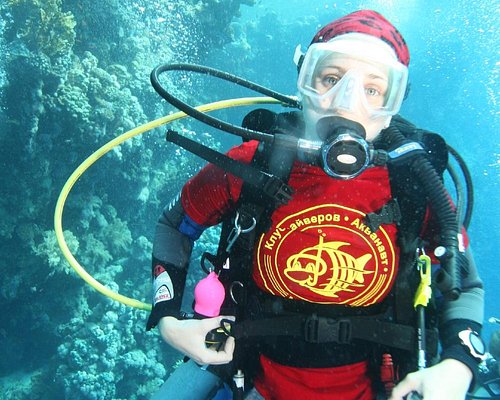
4. Akvanavt Diving Centre
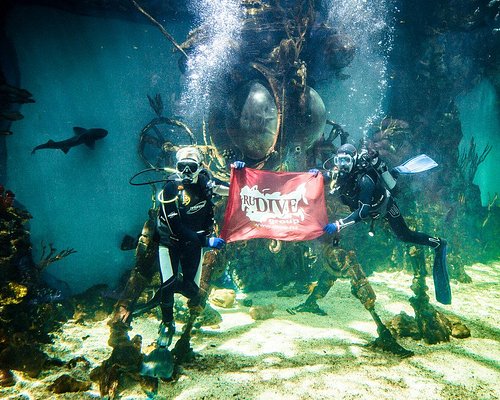
5. Diving Center Crocus City Oceanarium

6. CheapRussia Tours
7. Kite School Kiteclass

8. SUP Center
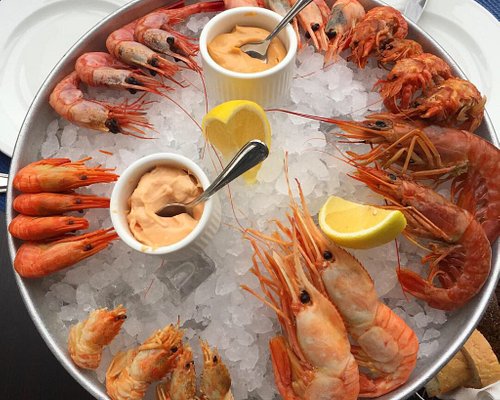
9. Erwin. Reka
11. Easy Russia Tour Guide
12. Lovely Russia Tours

13. Capital River Boat Tours - Moscow Centre

14. Alfa Centr
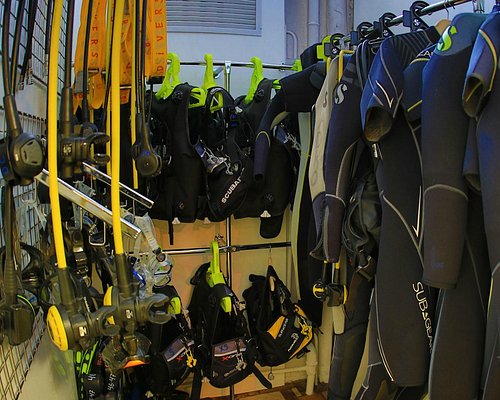
15. Diving Club Divers
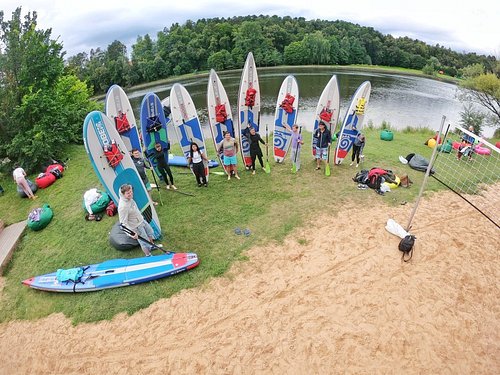
16. Sup Outdoor

17. MORE MOSCOW
19. Soho Sailing Style

20. Diving Center Crocodile

21. Dive-Project
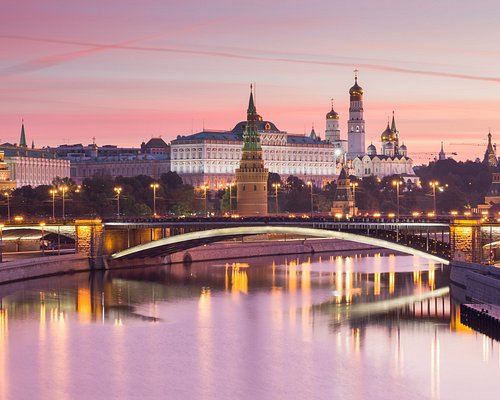
22. Mosparokhodstvo
24. Kosinskiy Children Marine Club

25. Kayak Moscow
26. DIVECLUB CHE

27. FLOW Moscow

28. Moswake

29. Morskiye Volki

30. S-cruises
What travelers are saying

- CheapRussia Tours
- Easy Russia Tour Guide
- Lovely Russia Tours
- MORE MOSCOW
- Insider Moscow Tours
- Flotilla Radisson Royal
- Moscow River Boat Tours
- Capital River Boat Tours - Moscow Centre
- Diving Center Crocus City Oceanarium
- Bahasa Indonesia
- Slovenščina
- Science & Tech
- Russian Kitchen
Cruising the Moskva River: A short guide to boat trips in Russia’s capital

There’s hardly a better way to absorb Moscow’s atmosphere than on a ship sailing up and down the Moskva River. While complicated ticketing, loud music and chilling winds might dampen the anticipated fun, this checklist will help you to enjoy the scenic views and not fall into common tourist traps.
How to find the right boat?
There are plenty of boats and selecting the right one might be challenging. The size of the boat should be your main criteria.
Plenty of small boats cruise the Moskva River, and the most vivid one is this yellow Lay’s-branded boat. Everyone who has ever visited Moscow probably has seen it.

This option might leave a passenger disembarking partially deaf as the merciless Russian pop music blasts onboard. A free spirit, however, will find partying on such a vessel to be an unforgettable and authentic experience that’s almost a metaphor for life in modern Russia: too loud, and sometimes too welcoming. Tickets start at $13 (800 rubles) per person.
Bigger boats offer smoother sailing and tend to attract foreign visitors because of their distinct Soviet aura. Indeed, many of the older vessels must have seen better days. They are still afloat, however, and getting aboard is a unique ‘cultural’ experience. Sometimes the crew might offer lunch or dinner to passengers, but this option must be purchased with the ticket. Here is one such option offering dinner for $24 (1,490 rubles).
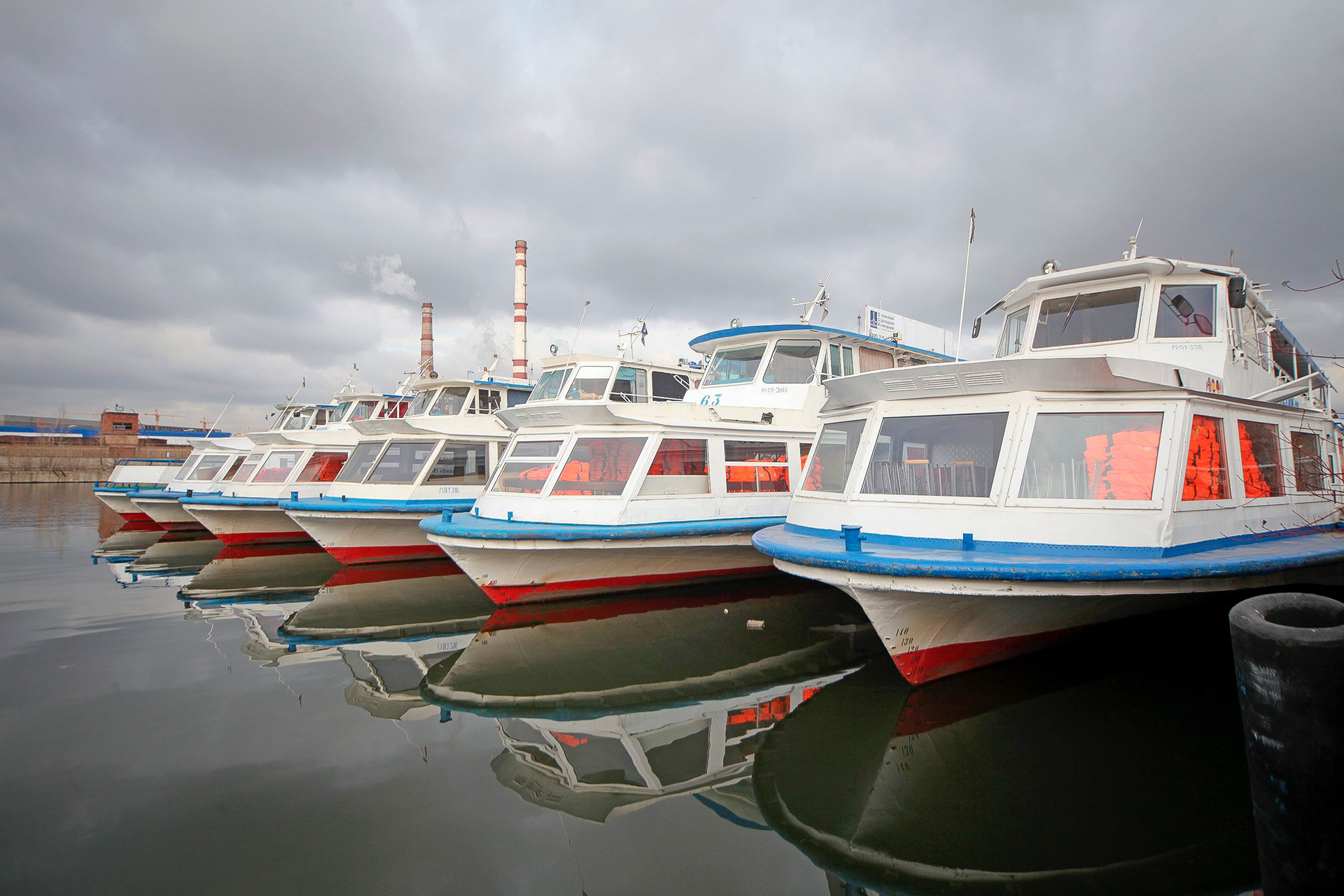
If you want to travel in style, consider Flotilla Radisson. These large, modern vessels are quite posh, with a cozy restaurant and an attentive crew at your service. Even though the selection of wines and food is modest, these vessels are still much better than other boats.
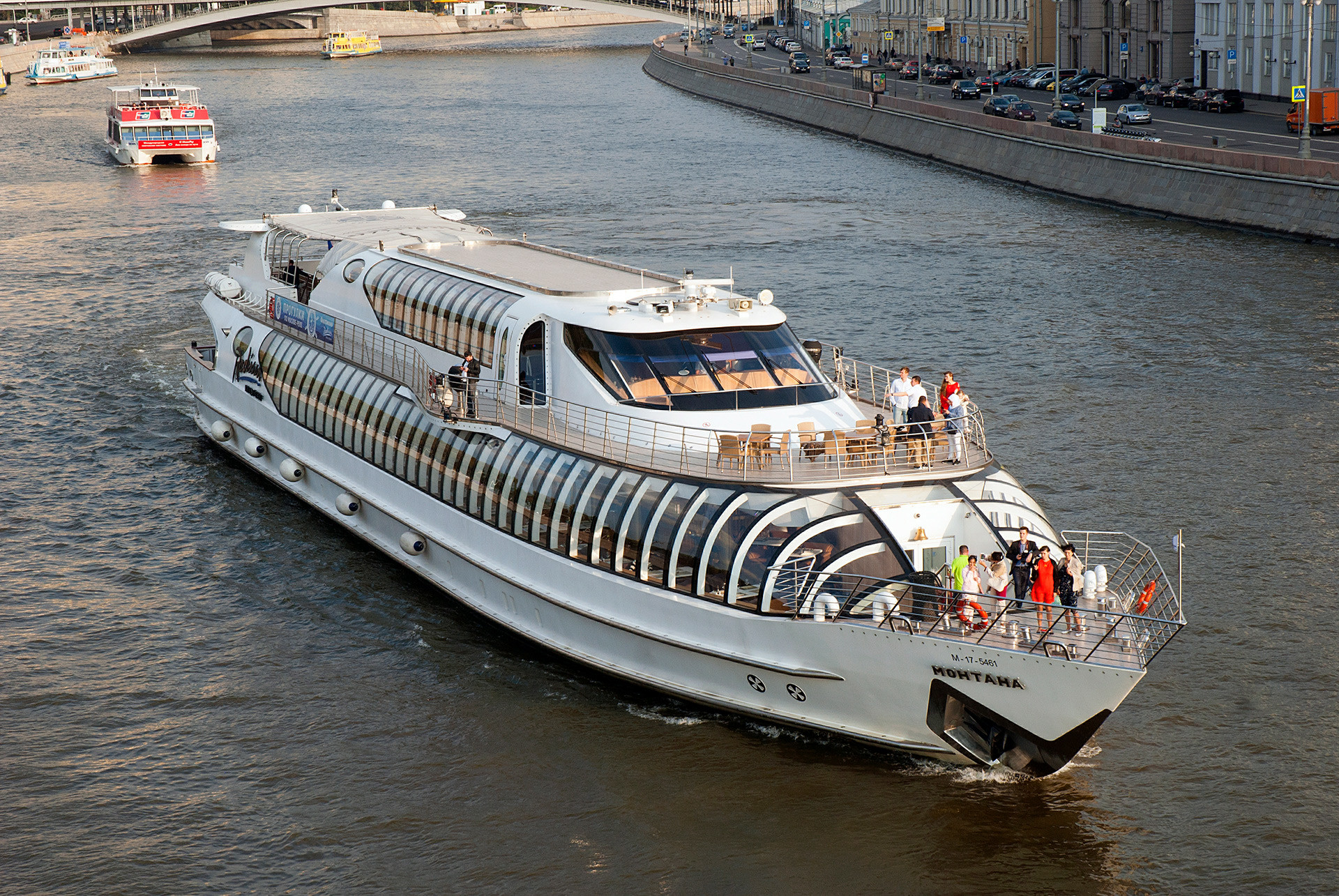
Surprisingly, the luxurious boats are priced rather modestly, and a single ticket goes for $17-$32 (1,100-2,000 rubles); also expect a reasonable restaurant bill on top.
How to buy tickets?
Women holding photos of ships promise huge discounts to “the young and beautiful,” and give personal invitations for river tours. They sound and look nice, but there’s a small catch: their ticket prices are usually more than those purchased online.
“We bought tickets from street hawkers for 900 rubles each, only to later discover that the other passengers bought their tickets twice as cheap!” wrote (in Russian) a disappointed Rostislav on a travel company website.
Nevertheless, buying from street hawkers has one considerable advantage: they personally escort you to the vessel so that you don’t waste time looking for the boat on your own.
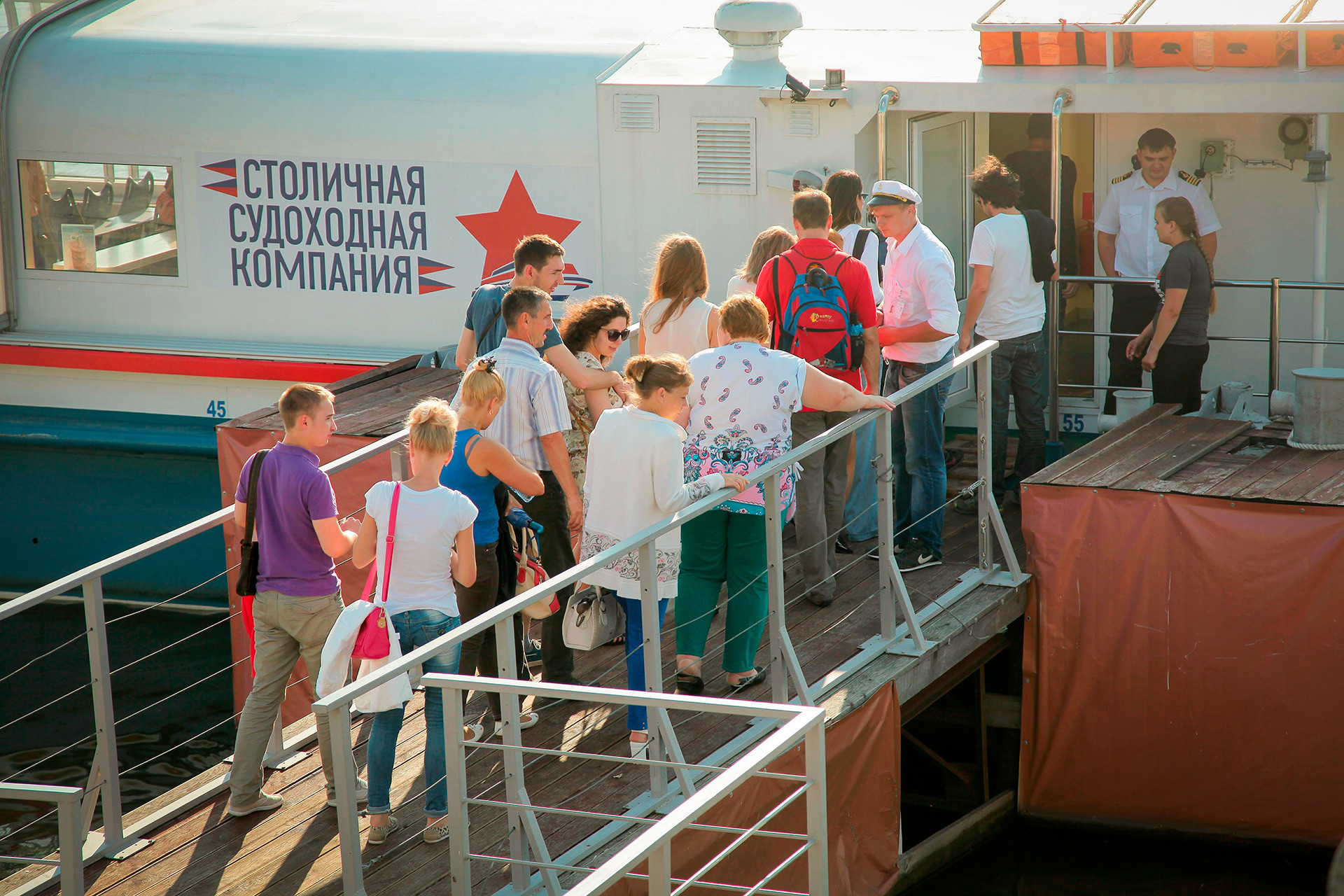
Prices start at $13 (800 rubles) for one ride, and for an additional $6.5 (400 rubles) you can purchase an unlimited number of tours on the same boat on any given day.
Flotilla Radisson has official ticket offices at Gorky Park and Hotel Ukraine, but they’re often sold out.
Buying online is an option that might save some cash. Websites such as this offer considerable discounts for tickets sold online. On a busy Friday night an online purchase might be the only chance to get a ticket on a Flotilla Radisson boat.
This website (in Russian) offers multiple options for short river cruises in and around the city center, including offbeat options such as ‘disco cruises’ and ‘children cruises.’ This other website sells tickets online, but doesn’t have an English version. The interface is intuitive, however.
Buying tickets online has its bad points, however. The most common is confusing which pier you should go to and missing your river tour.

“I once bought tickets online to save with the discount that the website offered,” said Igor Shvarkin from Moscow. “The pier was initially marked as ‘Park Kultury,’ but when I arrived it wasn’t easy to find my boat because there were too many there. My guests had to walk a considerable distance before I finally found the vessel that accepted my tickets purchased online,” said the man.
There are two main boarding piers in the city center: Hotel Ukraine and Park Kultury . Always take note of your particular berth when buying tickets online.
Where to sit onboard?
Even on a warm day, the headwind might be chilly for passengers on deck. Make sure you have warm clothes, or that the crew has blankets ready upon request.
The glass-encased hold makes the tour much more comfortable, but not at the expense of having an enjoyable experience.
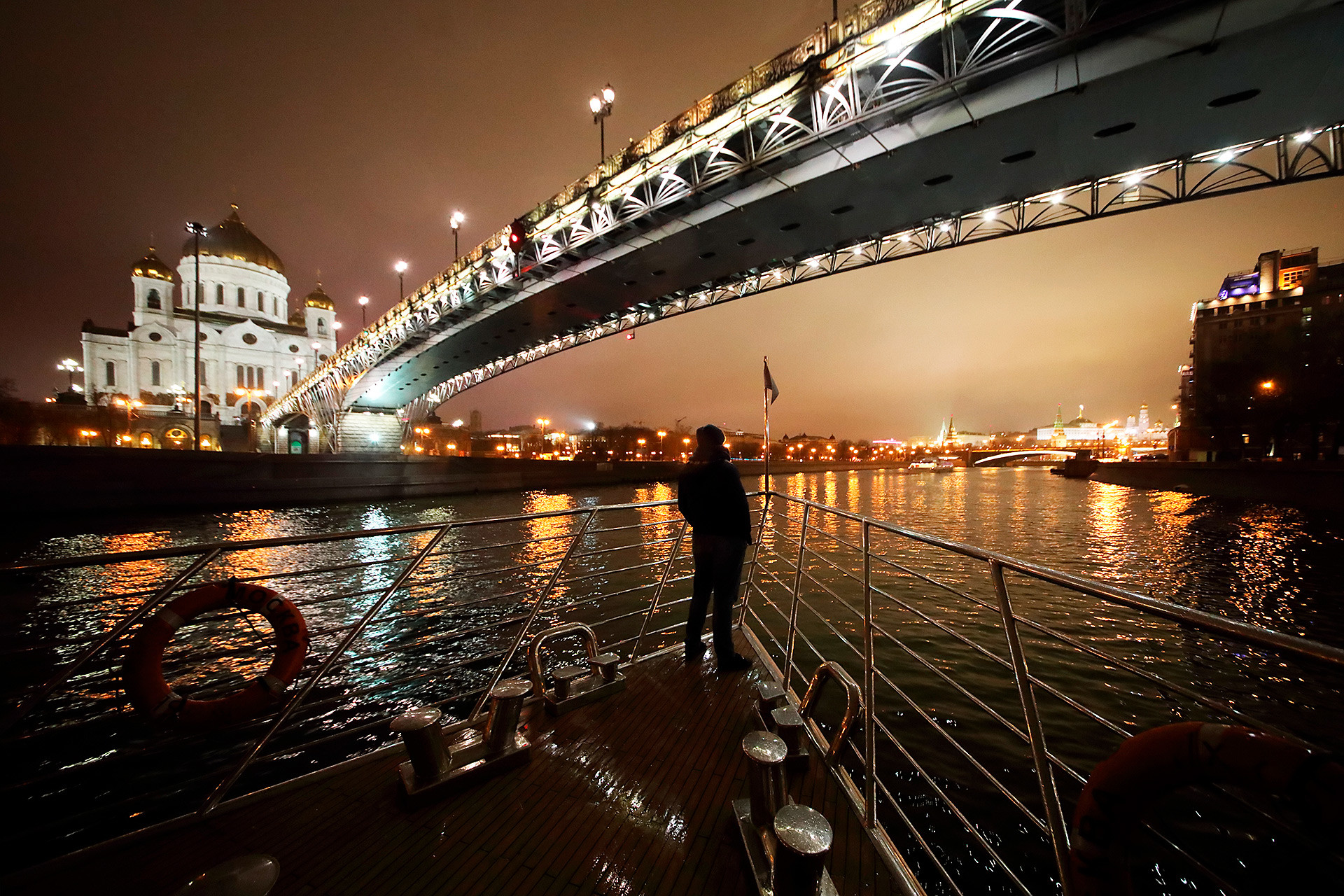
Getting off the boat requires preparation as well. Ideally, you should be able to disembark on any pier along the way. In reality, passengers never know where the boat’s captain will make the next stop. Street hawkers often tell passengers in advance where they’ll be able to disembark. If you buy tickets online then you’ll have to research it yourself.
There’s a chance that the captain won’t make any stops at all and will take you back to where the tour began, which is the case with Flotilla Radisson. The safest option is to automatically expect that you’ll return to the pier where you started.
If using any of Russia Beyond's content, partly or in full, always provide an active hyperlink to the original material.
to our newsletter!
Get the week's best stories straight to your inbox
- What to do in Moscow City, if you’re not mega-rich
- Moscow after dusk: 10 places to drink, dance, and groove
- 5 things you must do in Moscow in 2018 between football matches (or without them)
- Sandwiched between Moscow and St. Petersburg: How to spend a perfect weekend in Tver
- 24 or 48 hours in Moscow: Where to go and what to do in 2019
This website uses cookies. Click here to find out more.

IMAGES
COMMENTS
In the Strait of Gibraltar, one individual orca has been named by scientists as the main culprit for the attacks. White Gladis and her pod have been ramming boats in the area for the past few ...
On June 19 an orca rammed a 7-ton yacht multiple times off the Shetland Islands in Scotland, according to an account from retired Dutch physicist Dr. Wim Rutten in the Guardian. "Killer whales are ...
In a image from video provided by The Ocean Race, an orca moves along a rudder of the Team JAJO entry in The Ocean Race on Thursday, June 22, 2023, as the boat approached the Strait of Gibraltar.
Last month, the first instance of this behaviour was recorded in another place, when an orca rammed a boat near Shetland. "What I felt [was] most frightening was the very loud breathing of the ...
Why are killer whales going 'Moby-Dick' on yachts lately? Experts doubt it's revenge. An unusually large group of killer whales was spotted off the coast of San Francisco on May 7. The ...
On May 4, three orcas rammed into a Swiss yacht called Champagne sailing in the Strait of Gibraltar, reports Yacht magazine. After the first bump, crew members thought the vessel had collided with ...
Orcas Sank 3 Boats in Southern Europe in the Last Year, Scientists Say. A small group of orcas is ramming into sailboats in waters off the Iberian Peninsula. Researchers say they do not know what ...
A pod of orcas has sunk a yacht in the Strait of Gibraltar. A pair of orcas swim off the west coast of Vancouver Island in 2018. For 45 minutes, the crew of the Grazie Mamma felt like they were ...
Scientists don't know why. An orca pod seen in the Strait of Gibraltar in 2021. Ester Kristine Storkson was asleep on her father's small yacht earlier this month, sailing off the coast of France ...
Reported incidents of orcas ramming into boats, including yachts and sailboats near the Spanish and Portuguese coast have tripled in the last two years, according to data released by GTOA, a group ...
An orca repeatedly rammed a yacht in the North Sea off Shetland on Monday, in a concerning development following previous interactions between the cetaceans and vessels in the strait of Gibraltar ...
Iberian orcas started ramming vessels along the Spanish and Portuguese coast in July 2020, with at least 11 juveniles and four adult females believed to be involved.. Some boats had toothmarks on ...
0:56. A sailboat off the coast of southern Spain was recently attacked by a group of orcas that repeatedly rammed the vessel, breaking its rudder and rupturing the hull. The crew called for help ...
Three orcas (Orcinus orca), also known as killer whales, struck the yacht on the night of May 4 in the Strait of Gibraltar, off the coast of Spain, and pierced the rudder."There were two smaller ...
The researchers found that the orcas preferentially attack the boats' rudder, sometimes scraping the hull with their teeth. Such attacks often snap the rudder, leaving the boat unable to ...
Orcas ramming boats near Spain no cause for concern in N.L. waters, says expert. Deborah Giles, the science and research director at conservation group Wild Orca, suspects the orcas are simply ...
During 2023, we witnessed large pods of orcas ramming and sinking ships off the coast of Gibraltar. They would precisly target ship keels and rudders in order to disable the vessle!
The Grupo de trabajo Orca Atlántica recommends slowing down the boat's engine if possible. That has worked in about 60% of cases, said López. For the time being, Lopez said the best way to ...
Scientists witnessed one of the hunters, a male orca known as Starboard, single-handedly kill a 2.5-meter (8.2-foot) juvenile white shark within a two-minute time frame last year. "Over two ...
A single orca killed a great white shark in a shocking 2 minutes. This hunting behavior could mean problems for the fishing industry and tourism. Kelsey Vlamis. Mar 1, 2024, 6:31 PM PST. The ...
A killer whale is captured on camera hunting and "eviscerating" a great white shark in less than two minutes. ... ramming it in the side and grabbing the pectoral fin to keep away from those big ...
Halcyon Yachts was taking a 36ft boat to the UK when an orca rammed its stern at least 15 times, according to Pete Green, the company's managing director. The boat lost steering and was towed ...
Nearly an hour later, the boat saw an 8-foot-long (2.5 meters) juvenile white shark at the surface with Starboard chasing behind. "The killer whale pushed the shark forward by its pectoral fin ...
A killer whale breaches the sea surface. An infamous orca killed a great white shark by itself last year in South Africa and devoured the shark's nutritious liver. It's the first time a killer ...
The footage shows Sophia, the leader of a killer whale pod, spotting a swimming great white shark and body-slamming into the predator. In the clip, the orca surges directly into the shark's side ...
Speaking with BBC, Rhodes University shark biologist Dr. Alison Towner told the outlet that the male orca, nicknamed Starboard, grabbed the young great white by its fin and "thrust forward several ...
Moscow City: View Moscow Beneath Your Feet. $96. Details. River Cruise on Luxurios Radisson Ship with a guided excursion: time to relax and soak in the gorgeous Moscow landscape. Our guide will accompany you and reveal the details behind the structures on the river banks around you.
I've spent 20 years seeing and writing about whales, but I didn't see an orca again until 2017. Andrew Sutton and I were eight nautical miles off the coast of Sri Lanka, diving with a megapod ...
Explore the scenic and historic attractions of Moscow from the water with the best boat tours and cruises. Enjoy the views of the Kremlin, the Cathedral of Christ the Savior, and the Sparrow Hills on a relaxing or informative boat ride. Or, spice up your trip with some water sports and activities in Moscow. Find out more on Tripadvisor.
Surprisingly, the luxurious boats are priced rather modestly, and a single ticket goes for $17-$32 (1,100-2,000 rubles); also expect a reasonable restaurant bill on top. How to buy tickets? Women ...